#... ironic as doing so through the lens of my fictional characters may be
Text
extremely important to me that my satyr is completely sweet and naive and gentle and innocent and is still a satyr who loves to drink and do drugs and have as much sex as possible, likewise extremely important to me that my goofy little kooky mad scientist archetype wizard with a silly voice and funny eccentricities is also unironically beautiful and desirable and capable of sincere attraction and love, extremely and equally important to me for different reasons that are the same reason
#feeling so normal about the way I'm perceived by others tonight lol lmao#I think about 'nott is child coded' shipping discourse all the fucking time#in some ways she seemed naive and childlike#and in other ways I think she was just A Weirdo in a way female characters often don't get to be#and from either angle the result is someone who makes people extremely uncomfortable to imagine as having a sex life or even a libido#as a grown woman who is in many ways both childlike and just unappealingly weird. I think about it a lot.#hey maybe people who seem soft and sweet and gentle are also fully realized people with thoughts and depth and life experiences#hey maybe people who seem weird in a way *you* find unattractive are also fully realized people with thoughts and depth and life experience#maybe when you in real life are the quirky and deeply unsexy weirdo side character of a person this all feels very personal to you#I know I've talked about this before and I'm sure I will again#I don't know how else to think about things except repeatedly and aloud#I don't know what else I can do about feeling like I don't get to be seen as a whole person except talk about it#... ironic as doing so through the lens of my fictional characters may be#I dunno. I dunno. I need to go to sleep#about me#my OCs#nyssa#melliwyk
13 notes
·
View notes
Note
Hi, you may have noticed me spam liking your posts lol. I have a genuine question as someone who watched ofmd then black sails (and basically has no knowledge of historical or fictional pirates): what IS the lens that first time black sails watchers should have? Because of early season one, i cynically started seeing it as a misogyny fuelled Action drama. and yea i liked the other seasons better but that view of it kind of stayed for me. So i think i subconsciously interpreted a lot of the story choices as being made in bad faith. And i can't really get all the talk about the themes in the story, i didn't notice a lot of them. Do you have any advice on how to flip that switch like a different way to read the story lol i really want to Get this show.
Hi anon!
"What is the lens that first time Black Sails watchers should have" is a great question – and a complex one to answer. I know for a fact that you are not the only person who didn't vibe with it the first time (several of the persons in question now being some of its biggest fans). I have several pieces of advice for "getting it" (buckle in).
1: As you note, season one is quite different from the rest. It is a "product of its time" so to speak, that time being the height of Game of Thrones' popularity. That is the audience it was trying to draw in, and you can tell (I like to call this "straightbaiting"). Its criticisms are definitely warranted, but I would encourage you when (if) you rewatch to pay attention to how the expectations you draw from season one play into later seasons. Season one is all about theatre – the theatre of piracy. Sex. Violence. Action. But that's what it is, theatre. Notice how later seasons subvert expectations and drop the facade of the first few episodes.
2: As for the misogyny you mention. Yes, I agree that the first season makes some choices with its female characters that I would not. However, I caution against keeping such a skeptical attitude as the show goes on, because Black Sails contains and develops more female main characters than many of its contemporaries (and largely queer female characters as well!). None of them are there for set dressing or fan service. They are active agents integral to the plot. The role that women should/shouldn't play is one of the themes of "theatre" that continues through the show, like Eleanor playing the role of Mrs. Rogers (a choice that comes with great sacrifice).
3: If you follow my blog, there is absolutely no way you haven't come across the concept of "The Narrative". Black Sails is a story and knows it. Its basis on both history and fiction (and everything in between) imbues it with a ton of complexity, especially when it comes to inevitability (Treasure Island has to happen, the pirates can't win the war, etc.) Some of the themes you are having trouble seeing might become clearer when you don't suspend your disbelief all the way. See it as a story. And if you want to make it more fun, see how the characters themselves see it as a story. Jack want a legacy above all else. Flint sees himself almost as a Homeric figure. Silver (unfortunately ironically) fears above all else being locked into the role of a single character. Etc etc. It's all very self-referential and that's why I love it.
4: Overall, Black Sails requires a lot of deliberate critical thinking. It's not meant for you to take things at face value. You aren't supposed to agree with everything that Flint or Eleanor or whoever does. You're not supposed to believe everything they say, or assume that they themselves understand the motivations behind their actions. It's not straightforward, and that's what makes it great: you can come away with so many different nuanced takeaways and interpretations. Ultimately, there isn't really one "right" lens to view it through at all.
Anyway, I hope something in all of this helps! Thank you for asking, I'm always happy to provide my opinions!
#i'm off to an event for the rest of the night but i wanted to answer this first!#love a good ask#black sails
84 notes
·
View notes
Text
Between The Bloodshed | Chapter 20
Genre: Mafia!AU, Angst, Romance, Fluff
Pairing: OT7 x Reader
Characters: Doctor!Reader, Gangster!Namjoon, Gangster!Seokjin, Gangster!Yoongi, Gangster!Hoseok, Gangster!Jimin, Gangster!Taehyung, Gangster!Jungkook
Summary: Being a freelance doctor, this was just supposed to be any other job, helping a private client and taking care of him through his recovery. But you were not expecting to get caught in something so much darker that would change your life entirely.
The boys are trying their hardest to find you. And you are trying your hardest to find out more, to find out why you are so important.
Warning: This story is fictional and has nothing to do with real life events or the actual members of BTS. It may contain depictions of violence, blood shed/ gore and mentions of abuse. Please read at your own discretion.
Chapter warning(s): Kidnapping, hint of violence.
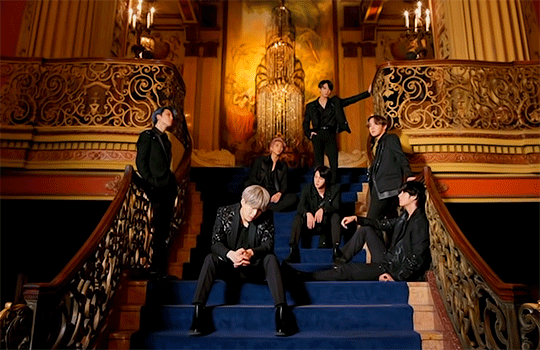
“W-What do you mean gone?” Namjoon was the first to break the silence.
“She was talking to some of our employees. Then she went to the washroom but never returned. They found this placed behind the stack of hand towels.” Jin opened his palm and all the boys saw your wing charm. The one that was supposed to be on your bracelet.
“So, she was taken?” Jimin asked in disbelief. His words made all their stomachs sink, this was their worst nightmare. This was supposed to be the perfect night for all of you.
“It’s obvious she was taken. She left this there for a reason.” Hoseok pointed to the black wing charm.
“There are hundreds of people here. Someone must have seen her. Namjoon, can’t you get access to the cameras? This is your building.” Yoongi asked.
“Let’s go.” Namjoon nodded and led everyone back in.
“I need access to all the security cameras. Now.” Namjoon commanded. The manager nodded, hurriedly bringing the 7 bosses to the security room. Taehyung sat down, typing away.
“Look out for her.” Jin said.
“There!” Jungkook pointed. You were being escorted out by a group of people, walking calmly to not attract any attention. But it was obvious that someone was pointing a weapon at your back to push you forward. For a split second, you turned to the exact camera the boys were watching, meeting eyes with the lens. The boys held their breaths as they watched.
“No...” They watched you get into a car and the car drive away into the night.
“Call a meeting. Now.” Yoongi growled, slamming his palm onto the desk. The boys were quick to move, exiting the small room.
“We’ll get you back.” Taehyung whispered, placing his palm against your face on the screen. Pursing his lips in determination, he ran out of the room to assist his brothers.
“We’re going now. Run the license plate number and put out a notice to our allies.” Namjoon ordered. Their car pulled up and they jumped in.
“Every enemy of ours is a potential suspect.” Jin said.
“We have thousands of people who want to kill us! It might be too late by the time we go through everyone. There has to be a better, more efficient way!” Jimin said impatiently.
“Give doc more credit. She is smart enough to survive a lot longer than we think. Besides, they won’t be so dumb to kill her off quickly. They’ll definitely come into contact with us to give us demands or make us do something for her to safely return.” Yoongi stated, crossing his arms.
“Young masters.” The maid opened the door for them.
“No more visitors. The house is on lockdown until further notice.” Hoseok ordered and the maid nodded, running off to inform the other workers of the house. The boys went to the other wing.
“As expected, the plate is of an old vehicle. It was meant to be scrapped last week.” Jungkook said.
“Get in contact with all your underground informants. Someone must slip somewhere. See if anyone has heard anything.” Namjoon sighed.
“I’ll go meet mine first.” Jungkook grabbed his coat, leaving the house once again. The boys tried to busy themselves but there wasn’t much they could do with no clues.
“We can hardly see their faces.” Hoseok pointed at the screen, rewatching the footage from different angles.
“We shouldn’t operate here. Let’s use ‘Magic Shop’.” Jin said. Magic Shop was a shared business between the 7 boys. Like the name, it had everything they needed. Information usually passes through there.
On your side...
When you woke up, you were in an unfamiliar place. You looked around to scan the area, it was a small concrete room with an old bed in the corner, a small barred window to the right and two doors, you guessed one led to a bathroom. Your hands were tied in front of you, ankle chained to the wall, and there was a dull ache at the back of your head. You remembered what happened.
You were finishing up in the toilet when you heard the door open and footsteps enter the washroom. From the heavy stomp of footsteps and heavier breathing, you knew whoever entered was male and not female.
*KNOCK KNOCK*
“Come out. We know you’re in there.” A gruff voice sounded. You remained silent but you knew that this can only go on for so long. As quiet as possible, you tried to get your phone out of your clutch to reach the boys but there was unfortunately, no signal.
“We’ll break the door down.” They threatened.
“Okay, okay. I’m coming out.” You sighed, hand resting on the doorknob. When you stepped out, you looked up to see two men that you’ve never seen before.
“Let me at least wash my hands first.” You raised an eyebrow. They looked at each other before nodding. You washed your hands with soap, not even meeting eyes with them.
“Are you done?” One growled in annoyance.
“Yeah.” You picked up a hand towel to wipe your hands then tossed the used towel into the bin.
“You’re gonna walk calmly, out of the building. If you dare do anything else, it’ll be the end for you.” You felt cold metal press against your lower back. You nodded as one opened the washroom door for you.
“Go.” They pushed you forward. As you left the washroom, you side eyed the gleam of a gem under the light. You only hoped that the boys would see it. No one suspected anything as you walked out of the building with two men behind you, one standing suspiciously closer than the other. A car pulled up to the steps of the building.
“Get in.” They opened the door. Turning around, you caught sight of a security camera, staring at it for a few seconds before the men impatiently pushed you into the car, slamming the door shut.
As the car drove, you tried to remember where you were headed or at least, some landmarks.
“You guys didn’t blindfold her?!” The driver finally noticed you. The male that was sitting next to you pulled out a blindfold, getting closer to you.
“Get away.” You tried kicking him.
“B*tch!” The male squirmed when you successfully manoeuvred yourself to get him in a chokehold despite the small backseat. But you had forgotten about the other person in the passenger seat.
“Sleep tight, princess.” There was an impact to the back of your head. Black spots appeared in your vision and soon, it was dark.
“Look who’s awake.” One of the doors opened, a bright light shining into your darkroom. You winced slightly at the sudden brightness hitting your eyes. A suited male came in, walking towards you. You stared up at him but the shadow made it impossible.
“Nice to meet you again.” He said, a teasing tone in his voice.
“Do I know you?” You groaned.
“How could you forget me? I’m hurt, doc.”
“Well, if you didn’t know how light directions work, the light makes it a little hard to see your face. All I see is a shadow now.” You hissed with a glare. Then he bent down and you saw his face.
“Recognise me now?” He smiled.
“Not... really?” You tilted your head. His smile fell from his face as he frowned. He backhanded you, waking you fall to the side. Your cheek throbbed and you tasted iron in your mouth, knowing that you were now probably bleeding.
“Look, I’m sorry you’re butt hurt about me not recognising or remembering you. But I meet new people every day. If everyone is like you and expects me to remember them, my job would be a lot harder than it already is. Stop being petty.” You growled. Usually, someone in your position would be more submissive, considering you didn’t have the upper hand.
“Ever the smart mouth, doc. Let’s see how long you can keep that up.” He threw his head back, laughing.
“I also wonder how long it will take for you to realise that kidnapping me and holding me captive isn’t going to do anything.” You raised an eyebrow.
“Oh, doc. Ever so naive. What you don’t know is that with you being here, my boss already has control over your 7 mafia bosses. They’re probably scrambling and panicking to find you.” He said.
“I’m just an employee.” You shrugged.
“That’s what you think. You think every employee has a diamond bracelet like you?” He asked.
“I never really cared, it was just a pretty bracelet to me. But I’m sure you’re about to tell me how important that is.” You said in a bored tone. Under playing everything was now your plan.
“Only the 7 bosses have that bracelet. It’s a sign of their highest rank. And guess who’s the 8th person to ever get one?” He smirked. You didn’t let it show but deep down, you were surprised. You never really noticed the bracelet on the boys. Because like you said, you never really cared or gave it much thought.
“So trust me, they’ll be here.” He scoffed.
“Hold on, I’m still trying to understand, so you and/or your boss is the enemy of the boys? You’re not from one of the families I cared for?!” You asked.
“Oh, doc.” He shook his head, laughing.
“Man, talk about shallow...” You rolled your eyes. The man just waved, heading for the door. He slammed the door shut, leaving you in darkness once again. You sighed, looking down at your dress that was now dirtied.
“Who is he?” You wrecked your brains to try and remember.
“The guy at the casino.” You finally remembered the incident that happened when you first had dinner with the boys outside, at Jin’s casino.
He tried to speak to you as you were coming out of the washroom and it ended with Yoongi escorting you to the car while the others ‘dealt with him’. Though at that point, you didn’t know what that meant. Now, you imagined how the boys must have given him a ‘stern warning’, for him to have such bitter feelings towards you.
“Talk about holding a grudge.” You sighed.
“No wonder they didn’t want me to remove the bracelet. Some VIP treatment this is.” You wondered out loud. You needed to find a way out of here, you couldn’t just sit and wait to be rescued.
“Let’s see.” You brought your bound hands up to your mouth, hoping to be able to use your teeth to try and loosen the knot.
“Here. Eat.” The door opened, making you put your hands down quickly. It was one of the men that kidnapped you from the ball. He held a tray and a bottle of water in his hands.
“Is it poisoned?” You looked at him skeptically.
“You never know until you try, right?” He raised an eyebrow, placing the tray in front of you.
“Just eat!” He hissed impatiently.
“You take a bite first. You eat it, I eat it.” You shrugged. The man was given strict orders to make sure that you ate. And all you were doing now was making his job a lot more difficult. He glared at you but you just stared back nonchalantly, not backing down either.
“It won’t be poisoned. We’re waiting for the 7 to come. If you’re dead, there’s no use in all this.” The man scoffed.
“If it’s not poisoned, then eat it.” You said. The man closed his eyes, letting out a deep breath. You knew you were being infuriating but your attitude was the only thing that you could use as a self defence now.
“I swear.” He scooped up the rice and kimchi, taking a bite.
“Now that wasn’t so hard now, was it?” You said. The guy clicked his tongue, undoing the rope around your hands to let you eat. He took a seat opposite you on the ground, but keeping his distance.
“This food is sh*t.” You took a bite.
“Well, it’s all you’re getting so learn to like it.” He crossed his arms. You sighed, eating your food in silence.
“Alright, I’m done. I might actually throw up if I continue.” You scrunched your face, pushing the tray. The man took the rope to bind your hands again. Seeing the gun holster on his waistband, you knew it would be foolish to try and fight back to escape now. So at this moment, you just had to be obedient and do whatever they told you to do.
“Ugh.” You threw your head back, trying to get the stiff kinks out of your shoulders and neck. You stared at the metal brace around your ankle, that was gonna be hard to get out of.
-
“Where’s Taehyung?” Namjoon asked when he came back from his meeting. It was safe to say that thanks to their parents, Namjoon and Yoongi had the most ‘ears to the ground’ in the group.
“He went for a breather.” Jimin informed softly.
“We need to think this through. Doc hardly meets anyone with us... Or at least, ones who are alive.” Hoseok said.
“I’m going for a meeting.” Jin looked at his phone. He stood up and left with his bodyguard in tow.
“Hyung is right.” Jungkook started a fresh document to list down the times you went to visit any of the boys’ place of business. Most of the time, the boys tried to go home for you to treat them since most of your equipment was at home but of course, there have been urgent times.
“She came to mine. But the person was dead.” Jimin raised his hand and Jungkook noted that down. The door opened and Taehyung came in. He dragged his bloodied bat on the ground, falling onto his seat.
“Where were you?” Yoongi asked.
“Just needed some fresh air.” Was all the younger said. Taehyung didn’t deal with emotions well, which is evident considering what happened with his father.
“Anyway, we’re listing down the times doc came to our place of business to maybe find out a time where our enemy might have seen her.” Namjoon got his up to speed.
“Did you forget she doesn’t even know that she wears our family band around her wrist?” Taehyung asked.
“Did she not even notice?”
“No, she didn’t even know what I was talking about when I mentioned it to her at the club the other night. She thought it was just a nice gift. I told her the gist of it but she probably thought that most, if not all, our employees have one too.” Jimin informed.
“Whatever it is. We’re all just trying to form at least a list of suspects. Every option, we’ll try it.” Yoongi said.
“She hasn’t been to Stigma or Singularity before. I usually handle those businesses outside and try to go home to get treated by her.” Taehyung crossed his arms.
“Stop looking at that.” He saw Jungkook still had the paused video of you staring at the camera on his computer screen.
“Let him be.” Namjoon chided.
“I got video footage from Daydream.” Hoseok informed. His place was one of the only one that the car could have possibly driven past. If they did, they would have a general direction of where you went.
“Hook it up to the screen.” Jungkook handed Hoseok the cable to hook his computer up to the screen and he played the footage from the night before. He carefully skipped forward the seconds, they couldn’t risk missing something. Everyone was quiet, their focus on the video footage in front of them. Jimin stood up from his seat.
“There. Fast backwards 10 seconds. Slow the video down.” He pointed. Hoseok moved the video back. In the slowed freeze frames, they saw the exact car drive past Daydream and take a left.
“Hobi, where does that road lead to?” Yoongi asked.
“Uh, the car slanted left. That leads to the highway... Up north, I think.” Hoseok pulled up the map.
“Yes. That highway heads north.” Taehyung said. Finally, the boys felt like they had a breakthrough. The kidnappers probably held you captive somewhere up north of Seoul.
“Who are the clans in the north?” Namjoon asked.
“Here they are.” Jungkook flipped through the photos on the screen.
“It is one of them. No one else would let another gang on their territory, knowing that they kidnapped one of ours. Unless they want an unnecessary war on their hands.” Yoongi said. Even if they did have enemies, a lot of gangs would rather be an ally instead. Bangtan was just that scary.
“I’ll call Jin hyung and let him know.” Jimin took his phone out, stepping aside to call the eldest, letting him know what they had found out so far.
It only took 20 minutes for Jin to come back, unsuccessful from meeting with all his informants. No one had a clue as to who was vengeful enough to kidnap you from Bangtan.
“We’ll start visiting some of them. You guys fill Jin hyung in on what’s going on. It’ll be faster if we split up to visit the gangs.” Taehyung said.
“Okay. Don’t be reckless.” Namjoon said. Jimin nodded, a silent promise to keep Taehyung in check. Grabbing what they needed, the duo left ‘Magic Shop’ immediately.
“Show me the photos.” Jin said. Once again, Jungkook pulled up the photos.
“Hold on. Go back.” Jin stopped the maknae. Jungkook clicked the slide, going back to show the photos of the leaders and righthand men from one of the gangs. Jin moved closer, squinting slightly.
“That guy... Don’t you recognise him?” Jin pointed.
“What do you mean?” Yoongi asked.
“We’ve encountered him before. That first dinner with (y/n) at my casino. He harassed her outside the washrooms. Jungkook came to rescue her in time and Yoongi took her away before he could reveal anything. We didn’t kill him since we didn’t want to make anything too obvious yet.” Jin frowned. The others finally remembered.
“But she didn’t have a bracelet yet.” Hoseok reminded.
“From the way Jungkook sprung to protect her... They must have been keeping tabs on her.” Namjoon concluded.
Just then, the phone rang.
~~
Ko-fi link
Series Masterlist
Tag list 1
@veronawrites @diamonddia-mond @georgie-me-myself-i @saveme-imfine @openup-yourmind @purelyecstacy @nlost21 @yiyi4657 @kimmieloveswho @i-like-puppy-mg @cait-with-luv @s-tae-rrynight @supertweetycherry @carolinexkpop @unatempesta-dipensieri @telepathylftv @taradevonne @top-crop @ifellinluvwithdorks @btslvts @bt21chim @kpopiskpopyunho @egm09 @designjet @lasagnaisjustspaghetticake @3musez @bangtansleftnut @deeepvibes @barbikatherine @xxminilah @missmxqn @kimahnjung98 @jbunnys-world @itspwi @gold--gucciempress @rainbow-zebra-unicorns @sinceritythatcouldntbedelivered @holaaaf @aconfusedidentity @samararose21 @shondlenoodle @singhsahara @scuzmunkie @foulstarfishprincess @fenderbenderr @uraveragefangirlsposts @jikook-enthusiasts @wendyiiwl @amyniu @bipolargal
Tag list 2
@vivpurple7 @mintvender @xcharlottemikaelsonx @enchantingbrowneyedgirl @imyourapocalypse @yeotlny @thatonepotatogurl @queenofthe-bitches @rosesolitaire @nello-rie @beach-bitch-bitch-beach @blauuu-adl @chickencrimpyy @purplelady85 @blglmgk01 @nochujeonjk @kevinssecretplace4546 @growlingyu @gimmythatjib00ty @missseoulite @ngcxjnny @silscintilla @miyochan @skyys-universe @aqueenieme @ryuyalana @galaxyflab @vishakhas-world @simrxnsingh @infernal-alpaca @the-hoe-ly-one @badbyetoyou @cstobitk @jeonginsvocals @ah2002 @lindsayjoy444 @sluthug @zhangyixingxing1 @moments-of-melancholy @stvvcks @dreamingofonceuponatime
Tag list 3
@imascreamerbabymakemeamute @vintageroses10 @elephants-bubbles-brachosauruses @woopetals @cinnamonlattae @untamedgrape @bunzom @tfkp0p @jisusnunjoon @cherry-suna @rosietae @clumsilyclueless @mamemimoimoi @fangirl125reader @iceyrian @historicalgigi @je-suis-une-criminal @thefreddieman @dopepursejudgetrash @dandelionthighs @novakitten0901 @marvelovernfan @tinyoonsblog @maknaeronix @cia161 @rjsmochii @katkrusade @channiespup @ot7jellostan @jamacaicanxbarbie @dommie14 @zae007live @softieforeveryone
#kpop#kpop scenarios#kpop series#bts#bts scenarios#bts series#bts x reader#bts x y/n#bts x you#poly!bts#bts poly#poly!bts x reader#poly bts#bts mafia au#bts mafia#bts mafia series#bts mafia fic#mafia#mafia au#mafia bts#mafia!au#mafia!bts#ot7#ot7 x reader#ot7 bts#bts ot7#ot7 x you#bangtan
674 notes
·
View notes
Text
(This post was inspired by a recent post by @kayura-sanada that I was going to reblog, but my own addition became so long and, frankly, off-topic to the original post’s content that I figured it was fairer to create my own post. But theOP I’m referring to can be found here and is a good read.)
Okay, so: this is a wonderful analysis of Tony Stark, @kayura-sanada, and I agree that it’s concerning seeing this written by a psychologist (although I think there has to be a little wiggle room in the fact that said psychologist is basing their diagnosis on their own interpretation, and - I would hope - it would probably change if Tony Stark were a real person who was their patient. I gotta hope that).
I agree with all of your overall points regarding Tony, but I wanted to reblog this specifically because this post is such a perfect example of a larger problem within fandom and fandom wank. The problem is that fictional characters can be interpreted any way you want, sure, but there’s a line between supporting your interpretation with evidence from the source, and supporting your interpretation with stuff you just kinda made up. There is a right and a wrong interpretation.
Here’s what I saw happen with this post: your response to the OP is lengthy because it dissects the OP bit-by-bit; it responds to the claims made in those bits with evidence from the films that supports a completely opposite interpretation of the character. And the response you got largely ignores all of that evidence and analysis in favor of a surface-deep response about open interpretations and how it’s “all just fiction anyway.”
And I see the same pattern repeat itself over and over in fandom:
“Character A is Trait B and that’s why they do Actions C, D, and E.”
“Actually, character A is more Trait F, and examples of Trait F are shown in Action G, H, and I.”
“Okay, but when they do Action H, they’re responding to Event J, but with Actions C and E, they clearly demonstrate Trait B, along with Trait K and L.”
“Well, but, saying they are/have Trait K is kind of a reach, and when they did Action H it was out of character, because in the same situation in previous films, they responded to Event J in a different way. For example, .....” (long post)
“I’m not reading all of that, it’s open to interpretation, and it’s just fiction anyway.”
Later, rinse, repeat.
And it’s like, look, yes, you can interpret the characters however you want. Fandom is supposed to be a fun, engaging space where fans are inspired to create new works and discuss all aspects of the source. Headcanons exists because of open character interpretation. Shipping exists because of open character interpretation. Rarepairs and alternate universes and ‘there was only one bed!’ and lots of tropes exist because of open character interpretation.
Without that open freedom to engage with the source/characters in whatever way makes you happy, fandom wouldn’t be what it is, and I would never want to discourage that.
That all said, it is possible that someone’s interpretation is wrong. That the way they imagine the character or the way they’re interpreting the character’s words and actions is a contrast to what’s really supposed to be going on in the scene or with the overall arc. The wrongness can come from any number of things - interpreation being colored by personal experience, preferences, projection, whatever.
In the case above, the psychiatrist is viewing Tony Stark through a lens of what they already decided the character is: a case of Narcissistic Personality Disorder. They took that lens and picked out (vague) examples of how the character portrays those traits.
This is fine. If that person wants to think Tony is a narcissist and that’s how they want to engage with the character and subsequent works (pretending that this was a meta post instead of a published article), then that’s their prerogative.
But upon closer analysis, the original interpretation kinda falls apart. The contrasting analysis takes a deeper look at the material and says, I don’t think what you’re saying is going on here is actually what’s going on here, and this is why.
But people don’t want to be told they’re wrong, especially in a fandom space, especially with something they hold dear to them (as interpretations can be intensely personal, and I know this). When the two interpretations clash, and one interpretation doesn’t really hold up to closer analysis, then suddenly, being critical of the source equates to disliking the source, and analysis is reduced to people just being negative and wanting to find things wrong with the source. Disagreeing with someone’s interpretation is taken as a personal attack. People get offended personally. The discussion devolves into ugly rhetoric, insults, or simply dismissiveness (”that’s nice but whatever,” “it’s just fiction,” etc).
And you might say, well, if you think someone’s interpretation is wrong, why are you trying to rain on their parade? Why are you trying to prove them wrong? Let people enjoy things! Let people fandom how they want! Let people write and create and be inspired in their own way!
To which I say, absolutely! Please, continue to enjoy the Thing and your interpretation of it. Continue to create through the lens of that interpretation. Create what makes you happy, fandom however you want to. I am a big proponent of “fandom and let fandom.” What other people like and dislike makes very little difference to me, and I’m certainly not under any illusion that everyone must see things the way that I see them or else they are Doing it Wrong. Nor do I take it personally if someone doesn’t agree with my take.
None of that is my point. My point is that it becomes an issue that splinters and fractures fandom spaces when criticism and discussion are discouraged, when long analysis posts are mocked, when threads are hijacked, when it gets to a point where disagreeing with someone’s take on a Thing cancels them - to you - as a person. Because you miss out. You miss out on discussion, and on engaging with creative fanworks, and widening your fandom circle.
Instead, the circle just narrows, and there’s an underlying sense of hostility that colors every interaction you have. And it makes it not fun for anyone.
People need to be more open to the idea that there is, in fact, a right and a wrong side to most arguments. They need to be willing to defend their argument in a way that holds up and, if they don’t want to defend their interpretation, that’s fine - more power to you - but they need to then stop making fun of and being generally shitty to those who disagree.
People need to stop pretending that analysis and critical thinking don’t matter. They need to stop pretending that “fiction” is this vague concept that has no bearing on the real world and shouldn’t be taken seriously. Fiction shapes our world, and art imitates life. Being unable to think critically about fiction indicates a larger issue of being unable to think critically about the things that do matter in the real world, like science and poltiics.
Just look at what this country has become. Each side believes it is the correct side, the “winning” side, but one of them is supported with verifiable facts and evidence and one isn’t, and when the one that isn’t is confronted with the fact that they are wrong, they either dismiss the argument entirely or go and find “alternative facts” from unreliable sources they can point to and say, see? A, B, C, D, and E may say I’m wrong, but F says I’m right, so fuck you.
I’m certainly not saying that fandom should be taken as seriously as politics, but I am saying that if people were more amenable to changing their minds or even just recognizing that criticism isn’t an attack and it’s not personal if someone dislikes a Thing that you feel passionate about - or vice versa - then maybe we’d have a better fandom space for all to enjoy.
And I do try not to be a hypocrite. I am open to changing my mind on positions I’ve taken in fandom - if the analysis and the evidence convince me that there’s another way to look at it. If someone is telling me I’m wrong, and they tell me why it’s wrong (yes, in detail), then I’m more than happy to take a second look. Maybe it will change my mind; maybe it will simply be something I’m cognizant of while I continue to enjoy the material in the way that’s most fun for me. Either way, I’m not trying to hold fandom as a whole to any kind of standard I wouldn’t also expect myself to meet.
That being said, this post is 90% me venting. Ironically, I don’t expect this to change anyone’s mind. I’m not saying there’s any one solution that will work for everybody or even that everyone sees a problem that needs solving. I’m just saying that I don’t enjoy fandom as much as I used to, and this particular pattern of "wank” (for lack of a better word) is the reason why.
#i may get hate#i may not have made my point#i may not have expressed myself well#but i DID need to get this off my chest#and the OP i referred to triggered a response bc it has been building for me for awhile#btw i am not referring to any particular discourse within the fandom#it is not directed at a Certain Divisive Film#it's rather just an overall problem that i see bc you could replace one discourse train#with another with a different film different characters whatever#and have these exact same issues#anyway there we are#delete later?#long post#tag rambles#fandom wank#the $0.02 no one asked for (but i will donate it anyway)#i'm legitimately afraid to post this lmfao
81 notes
·
View notes
Text
John’s “therapeutic” blog
I’ve been fascinated by the wealth of content in John Watson’s blog since I first noticed it; I think it was some time after S2. For being a complementary work to a TV show, it’s surprisingly well crafted and packed with information. Joe Lidster, who has written the fictional blogs and websites of John, Sherlock, Molly and Connie Prince, is a screenwriter who has been working also with Doctor Who and its spinoff Torchwood.
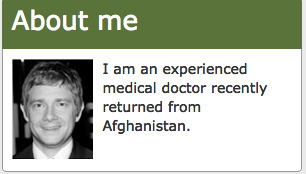
Unlike the rest of the content within the BBC Sherlock franchise, for example the online game ”Sherlock the Network”, the escape room “The Game is Now” or the book “Sherlock Chronicles”, John’s blog is fully available online for free, you don’t even have to register anywhere. And unlike the other blogs of the franchise (Molly’s and Connie Prince’s blogs and Sherlock’s website), John’s blog is lengthy and has a lot of posts in it. It gives us background and explanations of cases that aren’t mentioned in the show, or only referred to, and I also think it provides a “second opinion” of what we see in the show. It’s a bit like what John says in TLD:
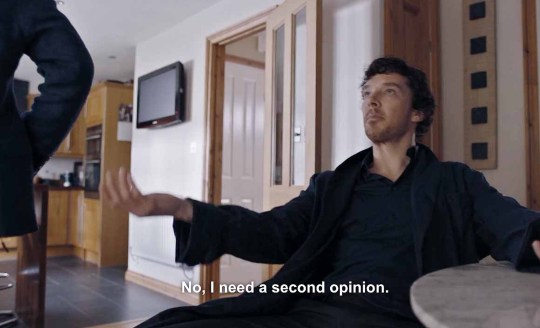
It certainly seems like this blog has been created as a special little treat for the fans, since most of the casual viewers of the show probably don’t even know it exists ‘IRL’. But I think the blog is much more than that; partly because it’s so heavily referenced in the show – with frequent, accurate and exact pictures of it (at least until S4) – and partly because it tells us so much about John’s character. I think John’s blog is significant and important in trying to analyse BBC Sherlock. And maybe the version of John we see in the show will actually get more nuances to it if we look at the blog, which is expressly written by John himself?
More under the cut.
As some of you might know, I’ve written a meta series (X) where I try to explore the idea (originally from @raggedyblue) that the blog describes the ‘real’ events in John’s and Sherlock’s life more accurately than the show, and that what we see in the show up until HLV is Sherlock reminiscing their life together while reading up on the blog. In my view, the show might be Sherlock’s embellished and dramatized version of the events - ironically a bit similar to what Sherlock usually accuses John of doing in both Doyle’s canon and on the blog. But I find the blog’s writing style far more prosaic than the show, and also more prosaic than Watson’s stories in ACD canon; in BBC Sherlock the roles might have been inverted compared to canon.
An example of this would be the scene in TEH (which I talked about in this meta over a year ago) where Mary is (supposedly) reading the following un-published post directly from John’s blog editor:
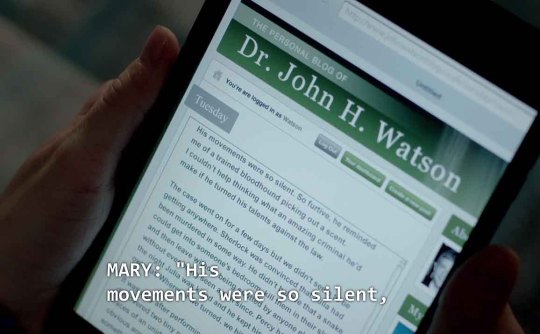
“His movements were so silent. So furtive, he reminded me of a trained bloodhound picking out a scent. I couldn’t help thinking what an amazing criminal he’d make if he turned his talents against the law.”
Something doesn’t seem quite right here, though. While the rest of the post is text from another, already published, post (The Speckled Blond), this first part is taken almost verbatim from ACD’s story The Sign of Four (SIGN). It describes a crime scene where Holmes has just “whipped out his lens and a tape measure and hurried about the room on his knees, measuring, comparing, examining, with his long thin nose only a few inches from the planks and his beady eyes gleaming and deep-set like those of a bird”. I see a big style difference between this and the rest of John’s blog. Since the quote above never appears on the ‘IRL’ blog, I’d rather believe that in BBC Sherlock this is merely wishful thinking from Sherlock that happens inside his Drama Queen Mind Palace. This impressive description is, I think, what he would truly wish that John had written. ;)
I also suspect that the continuing references to different blog posts in S4 are all made up in Sherlock’s mind, since John’s blog ‘IRL’ stopped updating after TSoT, when Sherlock hacked it and took over the storytelling.
Be that as it may, this meta is a reflection upon what John Watson’s famous blog actually might stand for, and what I believe it tells us about his character. In these months of quarantine, I’ve been passing the time by reading through the whole online version of the blog and taking notes of it.
Therapeutic origin
It seems like the initiative for John to start a blog came from Ella Thompson, his therapist. I believe Ella’s initial idea was therapeutic; if it was almost impossible for John to talk to her about his feelings and inner problems in their sessions, she might have found it difficult to help him. Therefore she suggested that he write it all down on his own instead. And if Ella could persuade him to talk about his life on an online blog, she would also be able to read it.
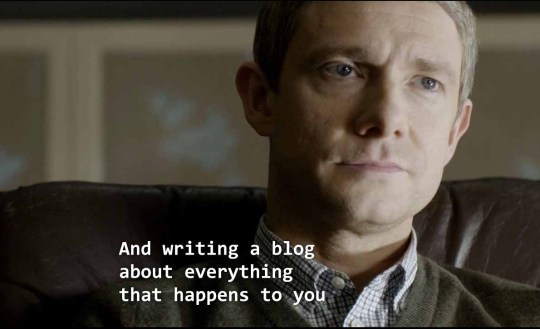
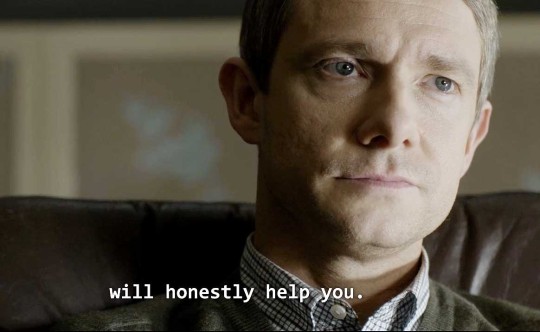
Of course this wouldn’t be the same as if John told her about his inner reflections in confidence, in a real therapy session, but maybe the blog would give him an incentive to talk about his life at all. And you have to start somewhere.
At the end of TST we see Sherlock visit Ella, but when she asks him to “open up completely” he refuses.
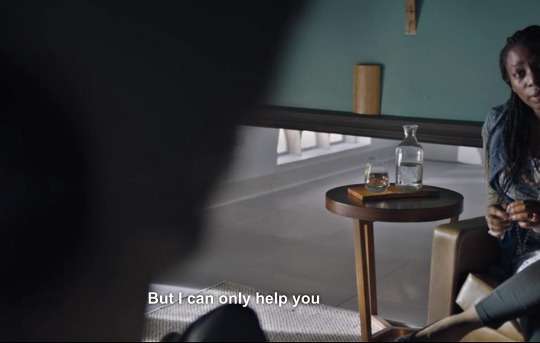
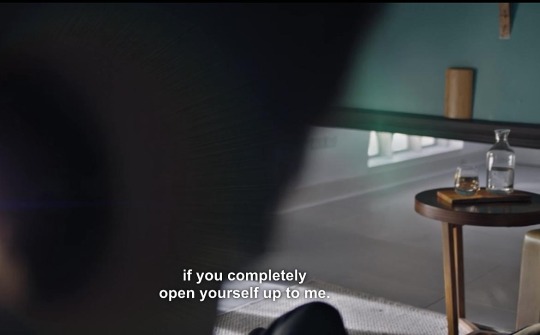
If S4 is happening inside Sherlock’s head (as I believe it is), this might have been Sherlock’s way of trying to psychoanalyse John, to ‘solve John’s case’, by envisioning the therapy situation in his mind palace. A well-known method of Sherlock Holmes is that he tries to put himself in the other person’s place and think about what his own response would have been to the situation. In ACD’s story The Musgrave Ritual (MUSG), Holmes says: “You know my methods in such cases, Watson. I put myself in the man’s place, and, having first gauged his intelligence, I try to imagine how I should myself have proceeded under the same circumstances.”
Which is also evidence that the character of Sherlock Holmes does indeed not lack empathetic capacity. Also in the show, John’s assertion that Sherlock “doesn’t feel things that way” etc. is basically BS in my opinion. The problem is that John refuses to see this.
John’s state of mind before Sherlock
John’s first three blog posts (in the middle of December - January) seem to completely lack motivation.

And this is maybe what one could expect from the deeply depressed John (as he appears in the beginning of the show), isn’t it? No surprises there.
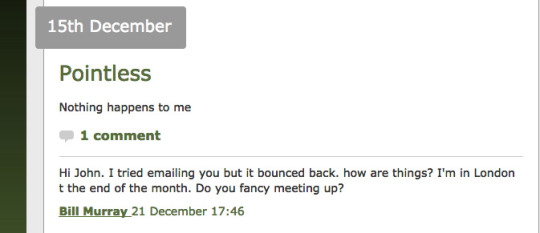
Everything seems meaningless, and John only makes two attempts at blog posts to comply with Ella’s recommendations, but he doesn’t actually write anything in them. After the second attempt his old army friend Bill Murray tries to contact him, but John seems to have cut off his ties with the rest of the world; he doesn’t answer the comment.

At the third attempt over a month later, John seems to want to delete the blog he has started, but lacks the technical knowledge to do so. The fourth attempt is just a snide comment to Ella:
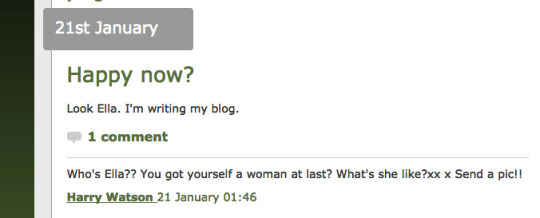
She doesn’t respond, however (not very surprisingly perhaps). Instead, John’s sister Harry discovers the blog and tries out this means of communicating with him. But John ignores her.
But at the fifth attempt at least John has gone out with some friends and describes it – almost bitterly. Sadly, it also seems like John met up with them mainly to avoid his therapy session with Ella.
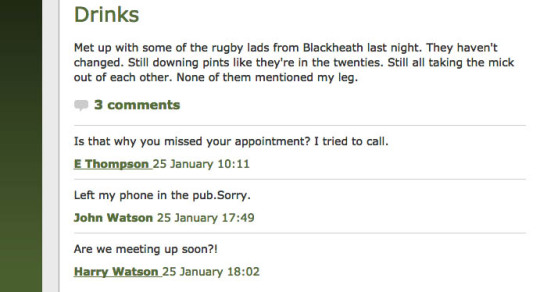
So, the problem is that whatever Ella may have thought that the blog would mean for John’s healing, I think she aimed well but unfortunately missed the target. John Watson does not ‘open up’ himself on the blog. When he finally starts to really write - after he met Sherlock - it’s not actually about him (supposedly); it’s all about Sherlock. Basically, John goes directly from ‘Nothing happens to me‘ to ‘Sherlock happens to me‘.
What the blog tells us about John ‘after Sherlock’
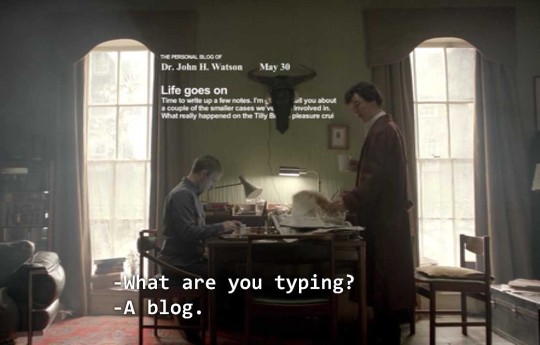
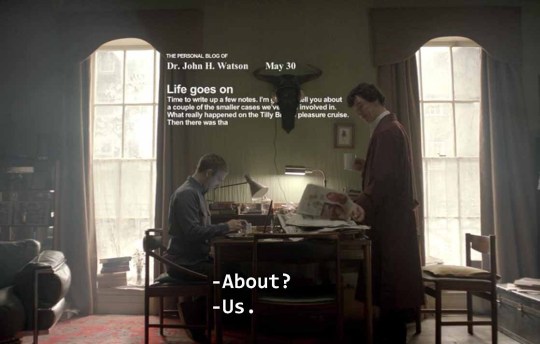
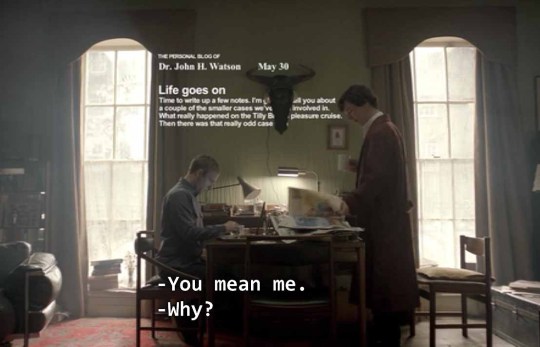
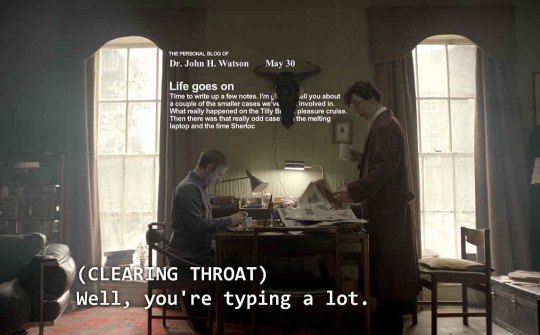
John’s blog may be all about Sherlock, but there isn’t actually that much praise for Sherlock in the blog posts as one might think. My impression is that John applies his (perhaps somewhat overestimated) writing skills to project his own failures and self-loathing on his closest friend. More than anything else, I think the blog is John’s emotional outlet for his frustration over his unsatisfactory relationship with Sherlock and his own inability to improve it. Instead of trying to actually talk to Sherlock, he uses the blog to vent his frustrations over Sherlock, speculating wildly about what he believes Sherlock is thinking and feeling.
The stories and adventures are thrilling and entertaining, yes. But his assessments of Sherlock’s character are really not very uplifting. John doesn’t strike me as an ‘analytic’ person, which in this case means that John’s theories about Sherlock are rather based on his personal emotions than logical conclusions. It’s sometimes even a bit difficult to follow the chain of events in John’s posts, because it’s usually so intertwined with his gossipy and out-of-context comments about Sherlock’s personality.
Unfortunately, Sherlock doesn’t seem to realise this projection, and neither do we see him address the issue of John’s misconceptions about him. I believe Sherlock takes many of John’s jibes and insults at him at face value, which – sadly - only adds on to his own self-loathing. I also think that Sherlock trying to draw conclusions about his mysterious friend through the written blog might be a mistake; it may eventually tell him a lot about John’s problems, but to see these he needs to look behind all the cover-up of blatant criticism of him, Sherlock. Maybe that’s what Sherlock’s trying to do in S4, by setting up scenarios in his mind palace?
Judging by how John comes across on the blog – and in the show – I think Sherlock’s claim “You’re abnormally drawn to dangerous people and places” in HLV is a perfectly sound analysis - on the surface. However, I think one must read between the blog lines in order to see other possible motives for John wanting to hang out with Sherlock. Reading John’s posts textually, he gives a strong impression that he’s there for the adventures; when there is danger in the air, John’s never bored.
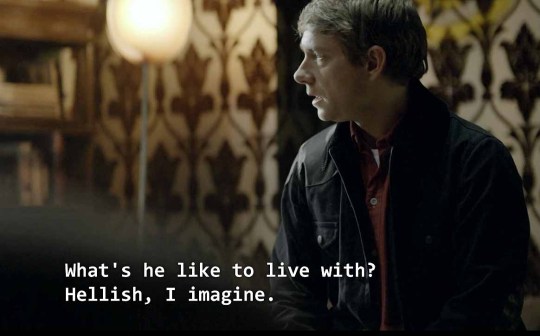
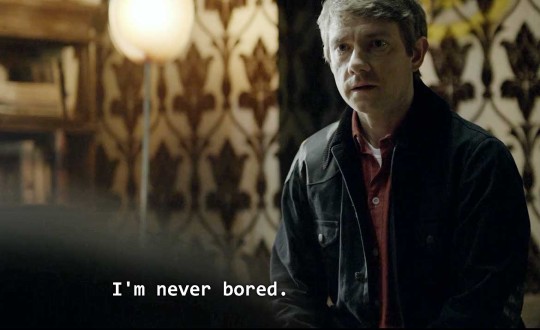
In the comment section Sherlock never mentions John’s evaluation of his character. Instead he repeatedly criticises John’s writing style. I get the impression that this is Sherlock’s subtle way of getting back at John without having to directly address John’s misconceptions about him. As I said above, I think John’s writing style is very different from Watson’s style in canon; far less respect for Sherlock and a far more prosaic and simple language. Canons Watson seems careful not to speculate much, while John does this all the time.
Examples that form a pattern

There’s a good deal of praise of Sherlock in John’s posts, but it has almost exclusively to do with his admiration for Sherlock’s intellectual capacity; he’s repeatedly described as ‘clever’ and after the Fall, John claims that “nobody ever really outwitted Sherlock”. But in fact, I’ve found very few blog posts where John doesn’t also criticise or complain about Sherlock in some way or another. And there are only two posts (out of a total of 45) where John says something positive about Sherlock’s character:
1. After their first meeting he calls Sherlock “strangely likeable” and “charming”.
2. In what John meant to be his last post ever (he believed Sherlock was dead), he calls Sherlock “funny”, “charming” and “everything a good person should be”.
On the other hand, there seems to be nothing in John’s own (supposed) opinions about Sherlock that he regards as too negative or inappropriate to publish online. I very much think this is about self-loathing; he projects his own shortcomings on his “psychopath” friend and flatmate. Like it’s always a relief to have a scapegoat. An additional explanation might be that if John is closeted and in public denial about any romantic feelings for Sherlock, this makes him not want to appear too ‘besotted’ on the blog. ;) Thus, he might believe he needs to compensate the praise with criticism. Problem is, with this contradictory approach the readers might ask: What is John’s actual relationship to Sherlock? Handler? Hostage? Lover? Concerned citizen? It’s hard to claim he’s a ‘real’, professional colleague, since John’s actual profession is a medical doctor. But why would John be friends with a psychopath?
To seriously claim that his best friend is a psychopath seems perfectly OK to John, though – he does it repeatedly, and quotes Donovan’s claim that Sherlock “gets off on it”. At the end of A Study in Pink, John talks about Sherlock and the serial killer as if they were both psychopaths, one undistinguishable from the other:
“The taxi driver drove him to a college of further education so they could both educate each other on - well, on how their minds worked, I guess. It's not something I'll ever really understand and, to be honest, I'm not sure I ever want to understand it. To be that much of a psychopath. To be that above the rest of us.”
John even seems to pretend to prefer ignorance to understanding, only to find one more opportunity to blame Sherlock. Here are some examples of other things John calls Sherlock publicly on the Internet:
Arrogant
Rude
Imperious
Pompous
Madman
Freak
Childish and
Not safe.
He also says on the blog that Sherlock is spectacularly ignorant about some things, like the solar system.
Little Freudian slips
In the post titled The Speckled Blonde
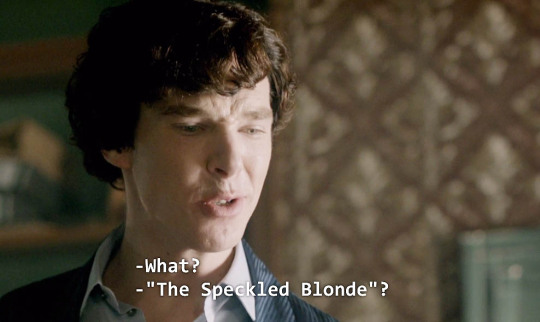
(which is basically a re-count of canon’s The Speckled Band - SPEC) John’s closet angst reaches new heights:

Apparently John finds it important to preventively point out to his readers that he was not sharing a bed with Sherlock. Or, actually, that he even preferred sleeping on the floor before sharing a bed with his flatmate. The thing is, however, that the information that they spent the night in Julias bedroom isn’t at all necessary for the story, since - unlike in ACD Canon - nothing of importance apparently happened during that night. John actually tells us nothing about the night as such. The only ‘feature of interest’ is that Sherlock found a suspect bottle of bubble bath on the victim’s night table, which he took to Barts for analysis (and he was right - the bath had killed Julia by poisoning). Obviously, John could have described this crime scene investigation entirely without mentioning that they had spent the night there. So, if this little morsel of information was so embarrassing for him, why did he even include it? Hmm...
In my biased mind, I can only think of two alternative explanations (not mutually exclusive, though): 1. John had spent so much fantasies and subconscious energy on reliving this night that he just couldn’t keep this info entirely to himself (Freudian slip), or 2. Something actually happened that night - something that had no bearing on the case. After all, John never says that he slept on the floor, only that he was going to sleep on it. ;)
Speaking of bubble bath, I find the fact that Julia died from it slightly suggestive, and even metaphorical, as such. Because there’s also another case on John’s blog describing someone dying in a bath: The Deadly Tealights. The victim suffocated in a bathroom where the candles consumed all the oxygen. John has included this little comment:

Why does John bring up the idea that a person taking a bath with candles would potentially be judged? What has his own bath routines to do with the crime case? Does the victim really need John to find excuses for his private life? Methinks this rather might be John’s closet angst speaking again. Someone has tried to belittle John for liking baths, and apparently John seizes the opportunity to vent about it on the blog. Metaphorically, this tells me that the closet is suffocating for John, and that the ‘chemistry of love’ is involved.
John - The Moral Compass
John is often referred to as the part of the duo who a) is more sociable and b) works like a sort of moral guide to Sherlock. The detective, on the other hand, is shown as a “sociopath” who supposedly doesn’t understand this kind of things. And – to be honest – Sherlock doesn’t actively say much to contradict this perception; sometimes he even appears to agree with it.
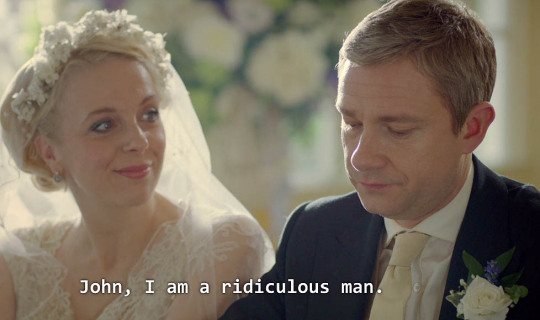
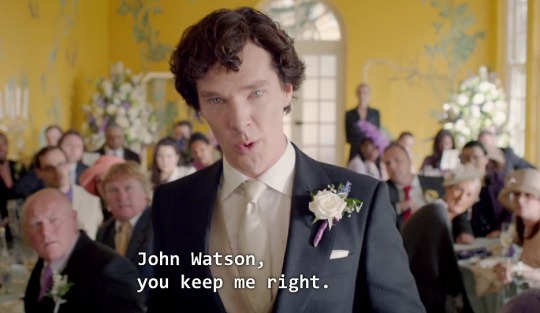
(I think his actions should be a clue to the contrary, though).
According to the blog, John seems to believe he himself is the adult one in this acquaintance, the one who does understand the rules of society. He repeatedly calls Sherlock “childish”. Judging by John’s descriptions in the blog, one might almost think that John had been forced to hang out with Sherlock, trying to do the best of it. But seeing as it’s entirely voluntarily it’s a bit hard to understand, for example, how John can blame Sherlock for “leaving me and Sarah to be kidnapped” in The Blind Banker:

John makes is sound like Sherlock left them to the enemy deliberately, knowing that someone would come after them. But weren’t they at home, supposedly on a date? If John didn’t like it, couldn’t he have left any moment and gone out to continue the date he was supposed to? But no; John counts himself among the innocent persons whom Sherlock “involves in his adventures”:

After reading the whole of John’s blog, all I can say is that this guy is a living, breathing contradiction. How can he be Sherlock’s moral compass if his needle is spinning all the time? :))
In The Great Game John describes himself as just a “pawn” in Sherlock’s and the killer’s great game, equalling himself with the other victims. With his insinuations, he indirectly blames Sherlock for the death of 12 people and goes back to Sally Donovan’s “freak” accusations:

Another interesting bit is this, describing Sherlock’s reaction at the pool, when John for a moment appeared to be behind everything: “I should have been horrified that he'd even doubt me for a second…” Wait – what!? John is capable of telling the whole world the most damning rubbish about his friend, but if Sherlock for any second doubted John, he’d be horrified? This part is also of interest: “But the laser sight simply moved to Sherlock's head and I was forced to let go. For a second, I wondered if Sherlock would have done the same for me but then all I knew for certain was, at that moment, I knew I was going to die.”
Before that, John had just described what could easily be interpreted as Sherlock calmly trying to talk Moriarty out of having John killed, but to John this was just “The two men talked, both clearly pleased to…”. In John’s view, he was the only one who was forced to let go of the killer because of the threat to Sherlock. Honestly, who is it, between the two of them, that most appears to lack empathetic capacity?
Creds and Competence
John appears to be a rather honest, humble and straightforward in the show, quite competent in his medical profession, and in TSoT he is highly praised by Sherlock:

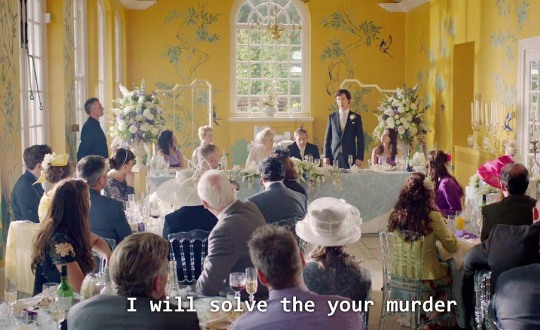
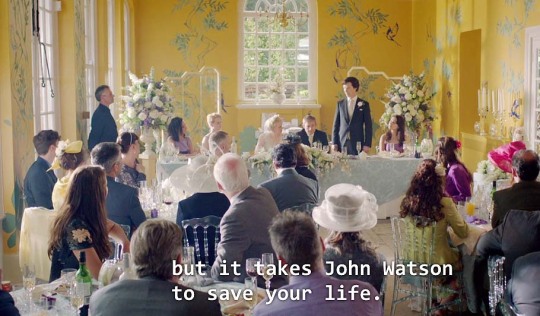
But on the blog John is more ambiguous, and he isn’t always modest. Sometimes he appears to enhance his own role in the crime solving and take credit also for things that are clearly Sherlock’s doing. For example, in The Great Game there’s this:
“Between us, we worked out that while Connie's death had been made to look like the result of a tetanus infection, it had actually been caused by poison - their houseboy, â–“â–“â–“â–“â–“, had overdosed her on Botox!”
But if we’re supposed to believe the show, John actually believed it was a tetanus infection, while Sherlock deduced and later demonstrated poison:
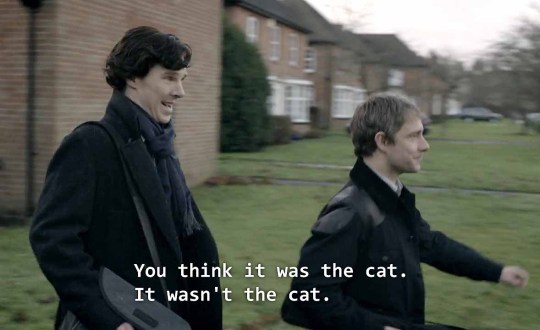
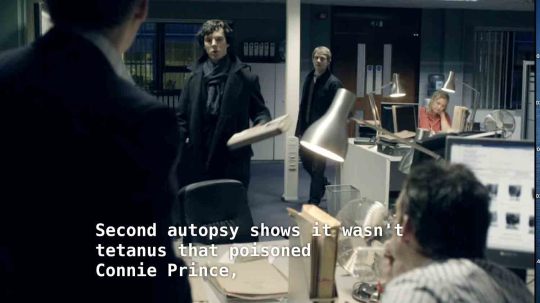
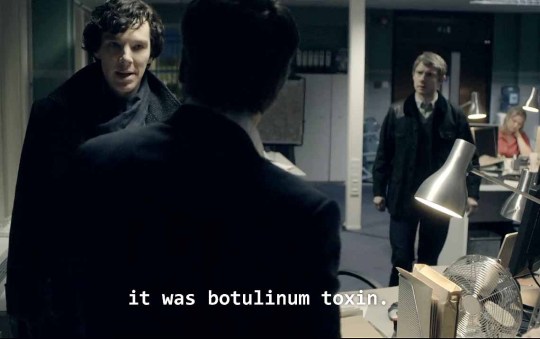
John also expresses a slightly childish vindictiveness in making a lot of fuss about Sherlock’s failures; every single time Sherlock can’t solve a case, John points it out on the blog with glee. It almost gives me the impression that the doctor is suffering from inferiority complex. He even uses “Sherlock Holmes Baffled“ as a title for one of their cases.

This seems to be written in jest, since Sherlock frequently is rude about other people’s lower intellectual capacity, but actually hates ‘not knowing’.
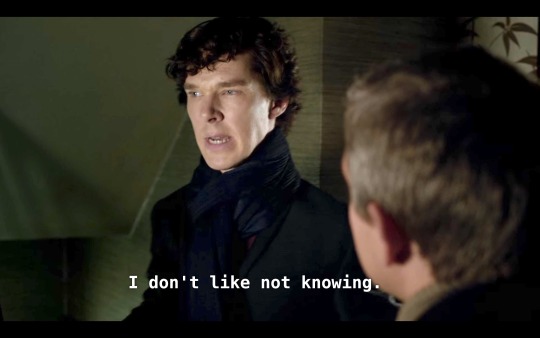
I admit that this may be funny to joke about once, but it gets a little tiresome that John has to point it out every time. Why does John even do this, even as Sherlock has explicitly asked him to not publish the unsolved cases? Which I assume would not be good for their business?
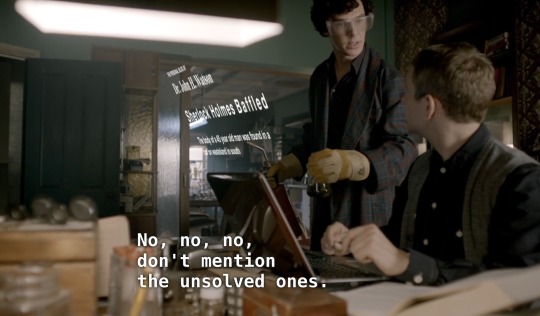
If John truly is Sherlock’s colleague, wouldn’t he also be more interested in helping to solve the cases, rather than talk about the failures? It seems to me that John is struggling so hard against his own feelings for Sherlock that he feels the need to provoke rather than help him.
The Most Inhuman Human
Sherlock’s supposed lack of humanity is a recurring theme for John; he claims that “people” want to know that Sherlock is human, as if anyone - on the blog or in the show - except John had ever questioned this.
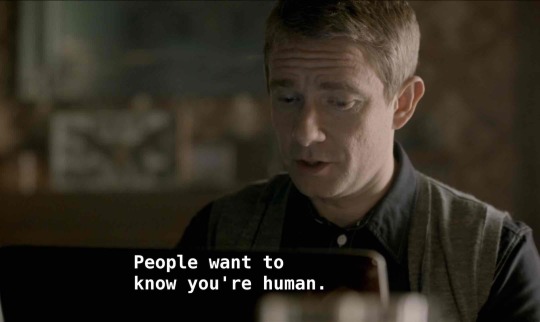
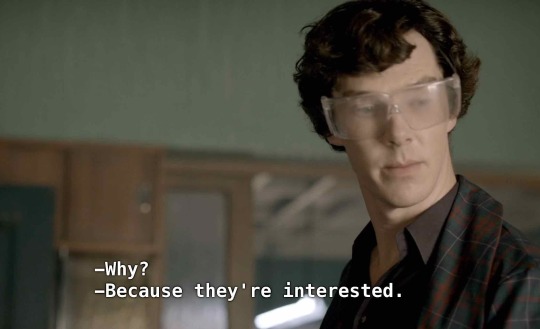
I can’t remember anyone on the blog except John showing an interest in this issue, though. In the post Many Happy Returns he writes this (my bolding):
“Yet the video... it showed the other side to him. He was rude, yeah. Arrogant. Apparently lacking in anything resembling empathy. But I'd forgotten just how funny he could be. He was so charming. So... human. It's bizarre because most people would say he was the most inhuman person they'd ever met. But he wasn't.”
He wasn’t? Wow - great revelation, John! [sarcasm :)]. But who said that, actually? Not even the haters and trolls on John’s blog ever claimed Sherlock was inhuman. It’s one thing that Donovan and Anderson called him a freak and a psychopath, but John is the only character I can think of who has ever implied that Sherlock would not be a human being. Only John calls him a ‘machine’. Which is a load of BS of course; John really doesn’t strike me as a professional doctor when he says this, even less as a friend - always trying to mark the distance.
So what’s Sherlock’s ‘complete lack of empathy’ in that video actually about (mini-episode here)? Was it because he didn’t want to go to a birthday dinner with people? Hardly - John seems to understand this about Sherlock. Or was it maybe because of his comment: “How can John be having a birthday dinner? All his friends hate him!” Well, this probably hurt a bit (even if I rather think he sounds bitter and jealous - he wants John for himself ;) ). On the other hand, Sherlock then backtracks and seems to regret his little outburst:
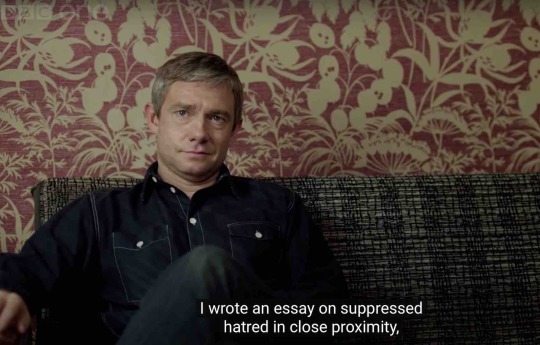
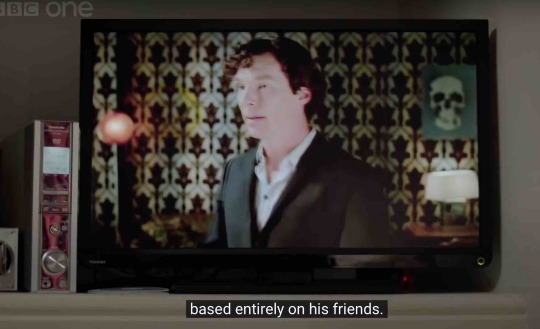
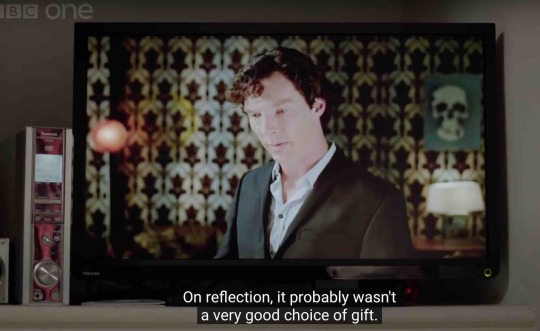
Mary’s role in John’s life
The blog is where Mary Morstan appears to be introduced to John; on John’s first blog post about at least a year after Sherlock’s ‘death’, she suddenly just shows up in the comment section, sending him kisses and inviting him out:
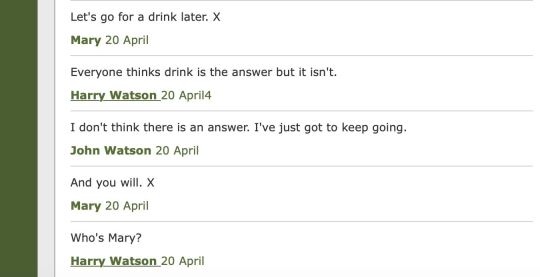
John ignores her, though, and when his sister asks him who Mary is, he doesn’t answer. Mary seems to hang in there, however, and the next time she appears is on the Deadly Tealights post (the one with the dead flatmate in the suffocating closet bathroom). And now she’s called Mary Morstan. Next time is The Inexplicable Matchbox. Both times her only comment is ‘ignore the trolls’. John rather seems to ignore her, though. Finally, he finishes his Many Happy Returns post (which was supposed to be his last) with saying that he has now “found someone” (without naming them) and should concentrate on that.
All this is a little bit weird, though, considering Mary’s comment in TEH, when she is logged in and reading aloud from the editor of John’s blog: “The famous blog, finally!” As if she hadn’t already read all his posts and tried to interact with him on the blog? Hmm.
In the show Mary just seems to come from out of nowhere, suddenly showing up in the graveyard holding hands with John.
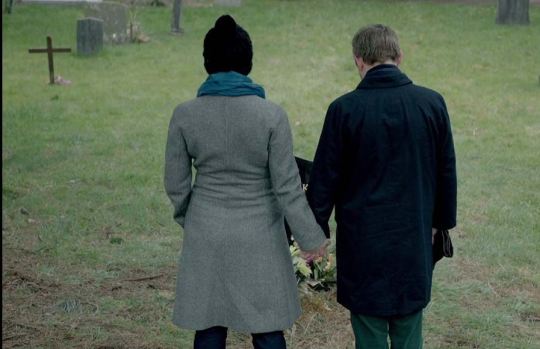
Her anonymity reminds me of Doyle’s treatment of Mary in canon, where she’s only mentioned by name when she’s still a client, before she marries Watson.
On the blog Mary is not mentioned by name until over a year after John met her, in spite of her presence in the comment section long before that. And it’s not until John’s first post after Sherlock’s return - The Empty Hearse - that John says something appreciative of her. Suddenly she is (still without name) "...the best thing that's ever happened to me. Sorry, Sherlock :)”. For the rest of the blog posts, John’s (very scarce) answers to Mary’s comments are never flirty or appreciative in the least. Mary’s own last comment, on the very last post - this time written by Sherlock who hacked the blog after John’s and Mary’s wedding - is this: “SHERLOCK! SHUT UP NOW!”
None of this gives me the impression that John has fallen in love with Mary. The silence with which he treats Mary on the blog rather makes me think of her as someone basically not very important; a sort of substitute in a desperate attempt to fill an emptiness in his life. And I think it might be significant that as soon as John recognises the existence of Mary in his life, he seems to use her as a sort of buffer towards Sherlock. A façade. First it’s the gleeful “Sorry Sherlock :)” comment above. Vindictive, it appears. And then, in the post Happily Ever After, John insists that his and Mary’s impending (heterosexual) marriage must clearly be the reason why Sherlock chose to help a gay couple getting together, one of them leaving an abusive marriage which was basically a façade. This whole ‘conclusion’ is so stupid that I’m rendered speechless.
Summary
To summarise - for those of you with enough patience to have followed all my ramblings in this marathon meta - I think the picture of John’s character that we can discern from reading up on the whole of his blog possibly tells us even more about him than the show. If the show reflects Sherlock’s mind, albeit almost entirely focused on his own perception of John Watson, this blog might actually give more insight into how John’s own mind works. I think it shows us someone who is struggling desperately with his own feelings. Someone who is trying to mark a distance that he believes is healthy for him, but that he actually doesn’t want, towards the object of his affection, by criticising them. The full-fledged, living, breathing contradiction that is John Watson comes to its full right by the blog. We could almost say he’s ‘human’ :). Kudos to Joe Lidster and the other showmakers for providing us with this gem.
Tagging some people who might be interested: @raggedyblue @ebaeschnbliah @gosherlocked @sagestreet @sarahthecoat @tjlcisthenewsexy @elldotsee @88thparallel @sherlock-overflow-error @yeah-oh-shit
217 notes
·
View notes
Text
Sometimes I lurk in "old" tumblr fandom pages for things and have thoughts which may or may not be good, especially when they are one of the more YIKES (tm) ones even back in the day.
But, I overthink and my brain shifted to Teen Wolf. Now mind, I myself never got into that fandom as it was as I said YIKES (tm) for so many reasons. And I never really got into it as a series based on what I thought was amusing sometimes as background noise with some bad writing or acting. I just watched episodes as they came on and off when it came out as I just graduated high school I have never been committed to anything in it from an analysis stand point. And honestly this is a one time piece from my usual fandom niches lol, don't expect anything else from me regarding Teen Wolf ever again.
But I suppose with all of this hesitancy my biggest issue may have been with the fan base itself. For posterity sake, I'm mexican/chicana and raised in that typical sort of household community and such and a lot of this is really just my own messy thoughts surrounding the entire sub-culture of Teen Wolf through that lens.
My major focus for this is oh boy, Scott McCall.
Mostly for the good, I dunno 10 years now as a lurker for this series, I had noticed the habit of a lot of white-anglo (European for specifics) fans saying that they themselves don't see how he is Latino or even Mexican as a characterization. Which fair yes, Tyler Posey being Latino himself was shoddily incorporated by a white writer and not exactly explored as it is in fact a very american Hollywood tool when it comes to Latino actors and characters. But the really just tone-deaf use of this is the expectation of mexican-americans specifically seem to need to "be" a certain way to white fans. This issue is already largely ingrained within the latino community as a whole and this is glossed over in hollywood media itself as it either puts us in the pile of "just being american" and assimilated or some other outdated stereotype of "all Latinos are the same anyways".
A lot of the rhetoric against him is that he might as well be white, nothing is explored in his heritage. Which is a fault of the writing itself even when it leaned into heavy Mexican concepts for one of it's arcs. (That is also a whole other level of misappropriation by hollywood and it's absolute separation of anything mexican within it's own country).
Usually chicano/a characters are not allowed to have the exploration of what being Mexican is in America. It is encouraged very heavily in society for the past 80 years or so as media became for prominent. Scott from 2011 to 2017 was not allowed to be anything other than his american side due to the writers and it's prominently white base. He was singled out as another white boy through the writing as that is what hollywood does to latinos. In their eyes Mexican is American only so much as it can can be used as a minority point for clout.
It is a shame that Scott McCall through Tyler Posey was not able to recreate what it means to be Mexican American. Even as an actor for things, that get Tyler Posey socially grilled and called out for has an edge of growing up in the southwest chicano society of california even with his own actions and wording. I see this analyzed by white-anglos without a lot of the heavy needed cultural context to some of these actions. Especially for men in latino culture, there is a lot of machismo that is used by them that comes off as off-putting as arrogant and cruel. It is not an excuse for him but very much a culturally ingrained specific issue that we are all unfortunately aware of.
It is also uncomfortable as a Mexican to see certain words even with Scott McCall the character to have certain terms slung around by white fans degrading him on basis of "meta" analysis for the past 10 years. A lot of the popular ones are that he is not good enough, disgusting, selfish, taking away the rights and not appreciating the actions of the two other white male leads, he uses them. He is talked of as lesser, while innocuous through the usual white meta lens as not being harmful, is harmful when mexican americans are subjected to those words through a fictional character. Cultural ignorance seeps through and is brushed off as only being said as hate of the character who for all intents and purposes is one of the few prevalent main brown youth leads given to latinos, shoddiness be damned.
We do not have the privilege of having more to look forward to when a character that was made to be white is given to us. The ironic thing is that if he stayed white his actions would be praised given that Scott McCall's friend Stiles (the white secondary) is made to be "better" than the brown boy in plenty of fanworks. Scott becomes dehumanized and derided in these works to a frightening degree. He is unpopular to the white audience and only so much of the excuse of anti-character meta can be used when the social ramifications and ignorance seeps through to those of latino background.
#tentatively tagging as#teen wolf#scott mccall#don't mind me#there is just a lot of cultural dissonance with this character that is scary for me#I don't even really go here
18 notes
·
View notes
Note
What is your opinion on Flemeth? I see so many fans praising her for being a bamf grandma, for saving Hawke and it confuses me. Didn't she abandon Elves? Didn't she abuse Morrigan? According to them not, because she was hurt and sad during their confrontation or that she actually never planned to possess her body. Her supposed friendship with Solas is iffy to me too.
Hi Nonnie! This answer is under a cut for sensitivity as it mentions abuse, and for length.
I think there’s nuance here. Liking (or appreciating the storybeats from) a fictional character, in the context of them as a character, doesn’t mean liking them as a person or agreeing with their actions. It also doesn’t mean that you’d endorse such actions happening in the real world, or that you’d like, support or spend time with such a person in real life. We separate the two. It’s okay to like her character and it’s okay to not like her. Certain things can also be true simultaneously - for example, like many characters in Dragon Age, Flemythal has done things that have had good impacts (such as saving Hawke, although it should be noted that she did this for her own benefit and in pursuit of her own ends), and she’s also done things that are questionable or even bad.
I like Flemythal as a character in a fictional setting. I find her very interesting. Mysterious, complicated, cryptic, plot-integral. I like that she’s powerful (she is pretty badass) and clearly has her own ends and agenda. That’s agency. Her voice casting is second-to-none and I find her involvement to have been one of the intriguing (and arguably iconic) staples of the series. She generates a lot of speculation and theorycrafting given that a lot of questions still remain about her, her past involvement in events and possibly her future involvement also. It’s also nice to see a visibly older woman in a prominent role, as they are often underused or underrepresented in media.
That said, she wasn’t a good mother. I don’t think she’s a good person, and multiple elements of her relationship with Morrigan do read as abusive (in several different ways too, as abuse has several forms). Morrigan compares her to Kalah Brosca, which is self-explanatory. Morrigan recounts times when Flemythal broke her possessions, taught her harsh lessons, told her horrifying stories, punished her or only gave her gifts which came at a cost. Morrigan’s Fade nightmare in the Circle Tower consists of the spirit/demon emulating her mother hitting her and saying horrible things (and such Fade-scenarios do in a way reflect what happened or what was perceived to have happened by the ‘experiencer’ in ‘the real’). Flemythal was manipulative, insulting and told half-truths to her. Morrigan’s personality is also in large part due to her background, Flemythal’s influence, treatment and teachings; it’s why she values survival and power above all, thinks that love is a weakness and makes some off-color, heartbreaking comments about love as a concept. It speaks of both the reality of what the Evanuris were like (compared to the Dalish conception of them as the Creators), the impact the murder of Mythal had on her as a being and of the further impact functionally fusing with the intensely aggrieved/angered human Flemeth, that this is the kind of parent that Mythal the Protector and All-Mother, goddess of love and patron of motherhood, was to Morrigan. Thinking of it in those terms makes it seem sadly ironic and puts me in the mind of the perversion of spirits of Justice away from their purpose towards Vengeance (not literally exactly, but thematically?).
Prior to the murder, Mythal in her fullness was the “best” of the Evanuris, according to Solas’ account, but even then... The best of a bad bunch is not exactly much of an accolade, and although she cared for and protected her people and was often a voice of reason compared to other Evanuris that would mitigate the worst of their whims and excesses, she was still... a false-god divine-pretender, and essentially the queen of their extremely classist empire system. She may have had slaves marked with slave-brands. She struck down some Titans and gave their “land” to the People, and did “something” ominous-sounding to the Titans and/or the dwarves. She was a patron of vengeance as well as justice. Some accounts paint her as dark and vengeful, and Solas admits that she was “both of these [both the ‘good’ and the ‘bad’ versions of her from the tales] and neither.” (“It’s more complicated than that”!) To add, Mythal being the best of them is Solas’ opinion, no doubt partially colored by his personal history with her. It’s difficult to comment on Mythal in her fullness and the Evanuris in general though, as all we have are partially biased accounts and scraps like misremembered tales and Codex entries which each come filtered through the respective lens of their writer.
Flemythal did seem to express sadness or regret in her DAI encounter with Morrigan. This is another one of those situations with nuance and where two things can be true at the same time. Flemythal was a bad parent and was abusive towards Morrigan. Flemythal also seems to care for her, in a way. I make no comment on other peoples’ experiences or on the majority of cases, and in no way would Flemythal’s treatment of and dynamic with Morrigan be acceptable in a real life situation, just, speaking from direct personal experience, there are sometimes instances where the abusive relative did care about their respective family member at the time, and later felt sad and regretful about the things they did to them and the impact it had on them. And she did intend the essence of her godhood as a gift for Morrigan, not hostile possession.
Her abandonment of the elves is something that can come up both with Lavellan and other Inquisitors in those scenes: “If Mythal is a part of you, why haven’t you helped us? We’ve called to you, prayed to you.” “[looks away and looks sad] What was could not be changed.” “What about now? You know so much.” “You know not what you ask, child.” // “If Mythal is within you why not reveal yourself?” “And to whom should I reveal myself?” “To the elves, to everyone!” “Hah... I knew the hearts of men even before Mythal came to me. It is why she came to me. They do not want the truth, and I... I am but a shadow lingering in the sun.” I do wish she had interacted more with the elves in Thedas, especially given the lot of modern elves there and especially considering Dalish tales of and reverence towards her as Asha’bellanar (Merrill bowing to her in DA2, how Marethari sought her out in 8:82, the clan that turned Maric and Loghain over to her, the way Lavellan can mention their people speak of her legend).
The writing in that conversation is kinda frustrating in that it’s intentionally vague and more of a non-answer than a sufficient explanation to the question posed. But there’s some Thing we don’t know yet, something we’re not supposed to know about Mythal right now. It sounds like the truth of why and of the matter isn’t simple or... pleasant (“You know not what you ask” - that sounds like worshipping her, the reality of her, wouldn’t be good). In DA2 when Merrill bows, Flemythal asks her if she knows who she is beyond the title Woman of Many Years. Merrill replies that she knows only a little, and Flemythal says “Then stand. The People bend their knee too quickly.” It sounds kinda like “If you knew I was Mythal, and if you knew what Mythal and her compatriot gods and by extension our society was like back in the day, you wouldn’t be bowing to me and wouldn’t want to worship me.” sefesjfesfeksj this gap in our knowledge is maddening lol. Or perhaps she thinks that the elves wouldn’t want the truth, would reject it or would feel worse after learning it? The revelations in DAI that the gods are false and were actually jerks, that vallaslin were originally slavemarkings, that an elf caused their downfall (not humans) and that their ancient society practised slavery and all that - it’s a lot. If so, I do wish she would’ve let them make up their own minds about it though.
There’s also the question of whether the Dalish would believe her claims if she came forth with them. Some would, but her appearance is outwardly-human as the Inquisitor can note, and Solas didn’t make any real headway with most of the Dalish he encountered when he tried to talk about some of his knowledge with them before joining the Inquisition, and that was without including the undoubtedly seismic “btw, I’m one of your gods” part. Would she even be capable of doing much to help them in her current form? A shadow lingering in the sun sounds like she’s barely a fragment of what she once was, and only has a fraction of her old power. In the modern day she’s a powerful mage who can shapeshift into a dragon and cheat death with a Horcrux, sure. Is that enough to, say, destroy the human kingdoms, or radically alter the social position of elves in Thedas? To add, if you subscribe to the belief that there’s a connection between Flemythal and Andraste (with Shartan) and/or Tyrdda Bright-Axe (with her “leaf-eared lover”), it seems that she’s tried to change things before in the past along these lines and failed.
Who are “the elves” to her, anyway? She mentions to Lavellan and Merrill how they are of the People, but we can see a back-and-forth on that subject with Solas during DAI, who at times says modern elves are his people, and at other times says they are not. Who’s to say who “the elves” or “The People” are to Flemythal in her mind, millennia later, really? If her conception of her people is ancient elves, not modern elves or both... Recall Abelas, one of Mythal’s lead acolytes: “'Our' people? The ones we see in the forest, shadows wearing vallaslin? You are not my people.” Maybe that’s why she hasn’t done much to help modern elves? If her people are the ancient elves, and if Solas’ plans don’t include modern elves, perhaps that’s why she didn’t do much for modern elves all this time but /does/ help Solas power up so that he can carry out his plans to help the ancient ones (along with the fact that her desire for vengeance depends on his success, of course). She knew he would come after all. An alternative reading is that his plans do include modern elves, but in order to save the People (and again also to get her revenge) she needed him (to gift her power to and do The Thing), and so until he woke up from his many years of slumber, all she could really do was wait for that moment? Their respective natures in the modern world are different; she’s just a spark of a dead goddess in a formerly-human vessel, a shadow lingering in the sun, and he’s still his proper full self, albeit temporarily weaker than usual. He specifically says in Trespasser that his situation isn’t comparable to Flemythal’s - “Are you a fragment of what Fen’Harel once was, like Mythal?” “No, this is all I have ever been”. It’s a stark difference in their two conditions, and it ties back to the question above of whether Flemythal’s abilities in the modern age would have been Enough to do anything concrete. In this reading, Flemythal’s nudging and influencing of history along a certain course through time, which she’s been doing in order to line up events just so so that the Evanuris will be unleashed again by Solas, take on a secondary motive too: lining up events just so so that Solas will be able to carry out his plans and in so doing, save the People.
Mythal’s relationship with Solas is another one of those things that’s difficult to comment on, as we only have hints and pieces. They were close, that much is clear from the intimacy and familiarity on both their parts in the post-credits scene, from how he speaks of her in Trespasser, and from his desire to subject the Evanuris to an eternity of torment as a fitting punishment for the crime of murdering her. Fen’Harel statues in the Temple of Mythal, which Morrigan says is a thing that seems like naked paintings of Andraste in the Chantry. Wolf ‘guardian-like’ statues on either side of her Altar. The eluvian in the post-credits flanked by both a dragon and a wolf. Statues in the Deep Roads: “Many of them are for Mythal, though. And Fen'Harel. Not in a spot of honor, but guarding, attending. Protector and All-Mother, why are you honored here, so far from the light of the sun? And why was the Dread Wolf at your side?” Cole’s words, if they’re about Solas and Mythal: "He did not want a body. But she asked him to come. He left a scar when he burned her off his face.” Legacy dev notes stating that he was once her oldest friend. These are fragments and we can only try to infer. Were they involved? Was he her second-in-command, her spymaster, her consort, her enforcer, her confidant, the leader of her ‘kingsguard’, her right hand, her advisor, the ‘guardian wolf’ to her ‘Emerald Knight’, what? Was he once a spirit and he manifested a body at her behest? What events led to him burning her vallaslin off his face? Did they have a disagreement? To what extent was she using him? The specifics of their relationship and their respective positions therein aren’t, but what’s clear is that once, she needed him, he was in her service, and that there was fondness between them.
(For the record I don’t believe she possessed him in the post-credits, or that he absorbed her essence/Mythal-spark and now the Well-drinker is bound to him. I think she passed her godhood through the mirror to Morrigan and allowed Solas to take her power/strength, that’s all.)
There’s an undertone that Flemeth may not really have full autonomy in what she’s doing (or was doing), at least where her broadstoke actions and goals are concerned. After her angry rant about vengeance, [worldstate dependent] she looks up at the statue of Mythal. In both scenarios her expression then becomes kind of sad, and she looks to the side. “Alas, so long as the music plays, we dance.” That sounds kind of like she has no choice? Like something’s fated or she’s bound to her cause? Before Flemeth’s end, Mythal was to her as our hearts are in our chests. They are intrinsic and carry out their function - beating - no matter what, until death. Given the dichotomy of Justice and Vengeance as explored by the nature of spirits and demons, and the ‘spirit-adjacent’ nature of elves, it feels like she’s compelled to do what she’s been doing all these centuries, in pursuit of the goal of getting that all-important revenge. “Our destinies are not so easily avoided.” She gets so incensed when she rages about her vengeance, it’s like she’s consumed by it. The burning desire for revenge is what kept her wisp alive through the Ages, after all.
#dragon age#bioware#abuse#abuse mention#abuse cw#morrigan#queen of my heart#solas#cole#spirit boy#mj replies#anonymous#video games#mj meta
79 notes
·
View notes
Text
STALLI TALKS BATMAN THE LONG HALLOWEEN
The long Halloween
At times people question whether or not Batman truly has a place in our world as a hero of fiction. Is he too dark, too violent and will he ever truly rid the streets of gotham from the wave of crime plaguing.
From my perspective the answer will always remain a solid and emphatic NO! But that's not because I think Batman is some useless hero of another time, it's because I think Batman is a hero made specifically for Gotham and the broader DC universe, not our world where we have men in blue uniforms that do enough unjust brutalization. However, have you ever wondered how Gotham city managed to sink into the current state of a prototype hell that we know it as today. Well enter the long halloween a story written by Jeph Leob and illustrated by tim sale recently adapted into an animated feature. This amazing 2021 two part masterpiece of animation is about to be typed about by the hoodrat highness himself ME!
The long halloween on the surface is a simple mystery that also happens to chronicle the descent of gotham from being a city run by the italian mob to being one that is terrorized by villains of all shapes, sizes, genders and mental capacities. Some may roll their eyes at the thought of Batman punching another mental ill person into the wall, however this story is actually quite refreshing and different from most stories about the dark knight. Why? Batman is actually a detective.
I know its super fucking crazy but it’s the truth. Instead of being a human man with limited knowledge of technology outsmarting beings from alien civilizations 1,000s of years smarter than human beings. We see Batman solve a mystery, “who is the enigmatic holiday killer?”It’s really through this lens that Batman gets to shine as the hero that he is. Because quite frankly who in the gotham pd could take on something as absurd as a man who kills on holidays only.
The city of Gotham is basically a parable for hell. It will never get better no matter how much money Bruce pumps into it and the crime will never ever stop happening no matter how many criminals Batman throws into Arkham asylum. This is inherently tragic, but the truth of the matter is Gotham was once held in the tight grip of mobsters long before women who could control plants showed up.
Through the story of the movie we get to see that theme of descent be explored. What happens when you save someone or something and through the process they descend into being something much worse than you predicted. We see Bruce descend into a much better crime fighter and detective after solving the mystery of the holiday killer but we also see him slide more into being Batman and not Bruce Wayne the person. Losing his sense of self in his journey to better his city. Gotham city is saved from the clutches of the italian mob family headed by the boss “carmine falcone,” but it later falls into the hands of villains such as Poison Ivy, the riddler, joker and in the future bane. We see once good guy and hardworking lawyer Harvey Dent stop the crime families of Gotham but not before losing himself and becoming the sinister villain two face.Descent is dangerous and we must be careful of who we descend into when trying to achieve something. Good people find themselves in sticky situations all the time and the characters of the long halloween chronicle this excellently.
However, amongst all the characters, the stand out for me seems to be catwoman “selina kyle”. Catwoman over the years has been a beacon of storytelling . Once a woman who wore a cat mask, then a flight attendant who lost her memory, and finally a prostitute who becomes a cat vigilante after seeing batman in action. Selina Kyle kas made her way through many transformations over the years and some I've liked others “FRANK MILLER” I would love to forget for the rest of my existence.
Here we see an earlier version of her. One that puts on the mask of sexy, alluring and attractive but beneath doesn't really know who she is. Across the screen she is portrayed as someone who knows who she is now in the moment but may not have a good idea of who she is in the future or maybe even know who she was in the past. Across gorgeous action scenes and gripping dialogue heavy sequences selina is portrayed at her fullest potential on the screen, a woman on a mission to fully understand herself and how she fits into the slow but sure descent Gotham is going into. In the end of the film it is implied (depending on who you ask) that Selina is Carmine's illegitimate daughter. A revelation that instead of shaking her, seems to be like a puzzle piece that falls into place making her whole. ANd so ironically catwoman is one of the few characters in the movie that ascends instead of descends into anything.
I guess what i’m trying to express about this gorgeous two art animated feature is that Batman stories are always filled with one central theme. Identity and who we are as people. The long halloween ends with a new type of gotham that some may fear but for bruce its still the same city that needs saving and for selina its still a city she needs to survive in.
I can't recommend this film enough, if you have the time. GO watch it and enjoy it very much.
The long halloween 8.5/ 10
3 notes
·
View notes
Text
The Kurama Duality: My Very First Official Headcanon!
Ah, the Kurama duality.
I've been asked this a lot, and people seem to like my interpretation, so I figured I'd list my official headcanon here. I’ve gone into far more detail in my Kurama x Reader fic, Embracing the Seasons, specifically chapter 25, if you’re interested, but here’s a summary.
Let's get something out of the way: Kurama does not have a split personality disorder.
Yoko Kurama and Shuichi Minamino are not two different beings. They are one and the same. Kurama explicitly says this in the English dub: “This is a merger, not a possession.” In other words, when Yoko Kurama escaped from certain death, he fused his soul with that of Shuichi Minamino, and they became one.

I think there are three aspects of this duality. I know, I know. It's confusing because the word "duality" implies that there are specifically two opposing sides, but hear me out.
There is Yoko Kurama, the ancient demon, who was cold and cruel, and did all sorts of morally reprehensible things. He plotted and thieved, and probably killed anyone who stood in his way. While the dub isn’t explicit about the crimes he committed in his demon days, aside from stealing artifacts, I think, given Kurama’s feelings of regret, he likely made some horrible choices.

Then there is Shuichi Minamino, the human boy with whom Yoko Kurama fused his soul. As a result, Shuichi grew up with a soul that was at least half demon, and as such, he was probably not an easy child to raise, influenced by his demon heritage. Yoko Kurama’s intention, after all, was to leave Living World after he recovered from his encounter with Spirit World’s Special Defense Force. His mother, Shiori, showed him unconditional love and compassion, and it was through her tenderness that he came to love her.
But having these two disparate identities is a lot to handle. Here’s Yoko Kurama, who has a very demon perspective — no doubt, in Demon world, sometimes you just have to survive, and as such, Yoko Kurama is ruthless, vindictive, and cunning because he was successful at being just that. It is how one survives as a demon — on brutal instinct and carnage. On the other hand, here’s gentle Shuichi who was raised to be polite and empathetic with his fellow humans, who loves his mother and cares deeply for his friends. Shuichi is not Yoko Kurama, and even though their souls are fused together, Shuichi still has a childhood innocence, a naiveté about him. As he was growing up under the tender care of Shiori, Shuichi may have loathed her without completely recognizing why. And Shiori, bless her heart, may have attributed his misbehavior to childish tantrums. It wasn’t until he understood her selfless devotion that even the cold-hearted Yoko Kurama learned to love her, too.

These two equally valid pieces of himself are so different, their values and methodologies conflicting at times. They are impossible to consolidate.
To strike a balance, it was a third identity, Kurama, who surfaced to mediate between the two. He is able to harmonize Yoko Kurama’s ruthless and calculating calm with Shuichi’s kind-hearted, reflective nature. This is the Kurama with which the main YYH cast is familiar.
Again, Yoko Kurama, Shuichi, and Kurama are not different people, per se. They are one and the same, sharing the same soul. However, they can have wildly different tendencies, ambitions, and motivations.
In the English dub, Kurama refers to these aspects of himself as personalities or identities, which is perfectly fine, but I think such verbiage can lead people to think that he has a dissociative personality disorder.

I like to think of them as perspectives, and I use a glasses lens analogy to help interpret them. In Embracing the Seasons, chapter 53, Kurama explains to the reader character, his girlfriend, why he is so cold to her when he takes on his demon form:
“_____, I love you with every fiber of my being, as I’ve never loved anyone before. I promise you that. And thus, every component, every piece of my soul loves you as well. Even Yoko Kurama loves you. When I take his form, I may behave differently. It may help to think of each identity as me looking through tinted glasses of varying color. These lenses do not define my sight, but my mindset, my method of thinking.
“When I must be Shuichi, I see the world through a very human perspective. I live each day, waking up, going to work, doing my research, writing financial publications. I pay the bills, I shop for groceries, I spend time with friends. I live for my mother, for my stepfather, for Kokoda.
“When I must be Yoko, the glasses are tinted with another perspective. I see through the lens of a demon, guarded by instinct and ruthlessness. I am less concerned for the personal feelings of others, more focused on ambition, whatever goal is most prevalent. I have to be — this is how Demon World functions, ruled by the iron fist of power.
“And when I am Kurama, as you see me now, I understand both interpretations. I appreciate both perspectives and realize each have their strengths and opportunities. Right now, in Demon World and given the circumstances, Yokoʼs strength may very well be a necessity. Please understand that.”
In other words, when Kurama taps into Yoko Kurama’s strength and shifts into his demon body, he doesn’t magically lose everything that he learned as a human. Yoko Kurama and Shuichi are the same person, after all. He doesn’t forget what it means to be compassionate or understanding, but he may choose to disregard that piece of himself.
A really good example of this is in the Kurama vs Gamemaster episode. Kurama consciously made the choice to manipulate Amanuma, literally causing him to have a breakdown, and thus lose the game. He was crushed by this decision, riddled with guilt that he killed a child, but he knew he had to do it — otherwise, he and his team would have no chance at defeating Sensui.

Upon reflection, as confirmed by older Toguro/Gourmet who had stolen the mind-reading ability from Murota, Kurama was upset with himself because Yoko Kurama would not have even contemplated hesitating to kill Amanuma. He would not have wavered and potentially ruined his team’s only opportunity of escaping the Gamemaster’s territory. In other words, if it was Yoko Kurama who was in the same position, his demon perspective would have prevailed. He would not feel guilt or shame in making the decisions necessary to secure victory, not because he is heartless now that he knows what it is to be human, but because the existing goal was far more valuable to achieve than sparing a child’s life. Yoko Kurama can apply logic in a way that is so cold, so void of emotion that even Kurama may be rendered uncomfortable.
I could talk and write about the Kurama duality forever because Kurama is one of the most beautifully complex characters I’ve ever had the pleasure to come across. But, alas, I prefer not to bore you, dear readers. I hope you enjoyed this headcanon of my very favorite fictional love of my life, and please feel free to reach out if you have any questions or requests!
If you would like to reblog or refer to this headcanon in your own fanfiction writing, please feel free. A reference back to this post would be nice so others may enjoy it. <3
Pictures are obviously shots from the anime. I do not own them.
#Kurama#YYH Kurama#YYH#YYH fanfiction#YYH fanfic#YYH reader-inserts#shuichi minamino#Youko Kurama#Yoko Kurama#Kurama headcanon#Embracing the Seasons#Headcanon#Just a few thoughts#Yu Yu Hakusho#The Kurama Duality#Kurama/Reader#Kurama x Reader
192 notes
·
View notes
Text
IS THERE A BABY IN THE HOUSE?
November 27, 1948
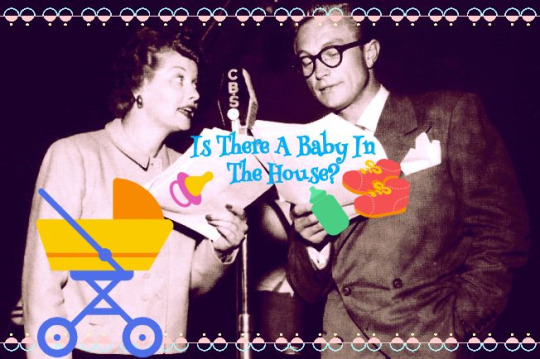
“Is There A Baby In The House?” (aka “There’s A Baby In The House”) is episode #18 of the radio series MY FAVORITE HUSBAND broadcast on November 27, 1948.
Synopsis ~ Liz goes over to meet the new neighbors and winds up minding a four-month old baby overnight.
Note: This episode was aired before the characters names were changed from Cugat to Cooper. It was also before Jell-O came aboard to sponsor the show and before the regular cast featured Bea Benadaret and Gale Gordon as the Atterburys.

“My Favorite Husband” was based on the novels Mr. and Mrs. Cugat, the Record of a Happy Marriage (1940) and Outside Eden (1945) by Isabel Scott Rorick, which had previously been adapted into the film Are Husbands Necessary? (1942). “My Favorite Husband” was first broadcast as a one-time special on July 5, 1948. Lucille Ball and Lee Bowman played the characters of Liz and George Cugat, and a positive response to this broadcast convinced CBS to launch “My Favorite Husband” as a series. Bowman was not available Richard Denning was cast as George. On January 7, 1949, confusion with bandleader Xavier Cugat prompted a name change to Cooper. On this same episode Jell-O became its sponsor. A total of 124 episodes of the program aired from July 23, 1948 through March 31, 1951. After about ten episodes had been written, writers Fox and Davenport departed and three new writers took over – Bob Carroll, Jr., Madelyn Pugh, and head writer/producer Jess Oppenheimer. In March 1949 Gale Gordon took over the existing role of George’s boss, Rudolph Atterbury, and Bea Benaderet was added as his wife, Iris. CBS brought “My Favorite Husband” to television in 1953, starring Joan Caulfield and Barry Nelson as Liz and George Cooper. The television version ran two-and-a-half seasons, from September 1953 through December 1955, running concurrently with “I Love Lucy.” It was produced live at CBS Television City for most of its run, until switching to film for a truncated third season filmed (ironically) at Desilu and recasting Liz Cooper with Vanessa Brown.
MAIN CAST

Lucille Ball (Liz Cugat) was born on August 6, 1911 in Jamestown, New York. She began her screen career in 1933 and was known in Hollywood as ‘Queen of the B’s’ due to her many appearances in ‘B’ movies. “My Favorite Husband” eventually led to the creation of “I Love Lucy,” a television situation comedy in which she co-starred with her real-life husband, Latin bandleader Desi Arnaz. The program was phenomenally successful, allowing the couple to purchase what was once RKO Studios, re-naming it Desilu. When the show ended in 1960 (in an hour-long format known as “The Lucy-Desi Comedy Hour”) so did Lucy and Desi’s marriage. In 1962, hoping to keep Desilu financially solvent, Lucy returned to the sitcom format with “The Lucy Show,” which lasted six seasons. She followed that with a similar sitcom “Here’s Lucy” co-starring with her real-life children, Lucie and Desi Jr., as well as Gale Gordon, who had joined the cast of “The Lucy Show” during season two. Before her death in 1989, Lucy made one more attempt at a sitcom with “Life With Lucy,” also with Gordon.
Richard Denning (George Cugat) was born Louis Albert Heindrich Denninger Jr., in Poughkeepsie, New York. When he was 18 months old, his family moved to Los Angeles. Plans called for him to take over his father’s garment manufacturing business, but he developed an interest in acting. Denning enlisted in the US Navy during World War II. He is best known for his roles in various science fiction and horror films of the 1950s. Although he teamed with Lucille Ball on radio in “My Favorite Husband,” the two never acted together on screen. While “I Love Lucy” was on the air, he was seen on another CBS TV series, “Mr. & Mrs. North.” From 1968 to 1980 he played the Governor on “Hawaii 5-0″, his final role. He died in 1998 at age 84.
Ruth Perrott (Katie, the Maid) was also later seen on “I Love Lucy.” She first played Mrs. Pomerantz, a member of the surprise investigating committee for the Society Matrons League in “Pioneer Women” (ILL S1;E25), as one of the member of the Wednesday Afternoon Fine Arts League in “Lucy and Ethel Buy the Same Dress” (ILL S3;E3), and also played a nurse when “Lucy Goes to the Hospital” (ILL S2;E16). She died in 1996 at the age of 96.
Bob LeMond (Announcer) also served as the announcer for the pilot episode of “I Love Lucy”. When the long-lost pilot was finally discovered in 1990, a few moments of the opening narration were damaged and lost, so LeMond – fifty years later – recreated the narration for the CBS special and subsequent DVD release.
GUEST CAST

John Hiestand (Cory Cartwright) served as the announcer for the radio show “Let George Do It” from 1946 to 1950. In 1955 he did an episode of “Our Miss Brooks” opposite Gale Gordon.

Frank Nelson (Mr. Brennan) was born on May 6, 1911 (three months before Lucille Ball) in Colorado Springs, Colorado. He started working as a radio announcer at the age of 15. He later appeared on such popular radio shows as “The Great Gildersleeve,” “Burns and Allen,” and “Fibber McGee & Molly”. Aside from Lucille Ball, Nelson is perhaps most associated with Jack Benny and was a fifteen-year regular on his radio and television programs. His trademark was playing clerks and other working stiffs, suddenly turning to Benny with a drawn out “Yeeeeeeeeees?” Nelson appeared in 11 episodes of “I Love Lucy”, including three as quiz master Freddy Fillmore, and two as Ralph Ramsey, plus appearance on “The Lucy-Desi Comedy Hour” - making him the only actor to play two different recurring roles on “I Love Lucy.” Nelson returned to the role of the frazzled Train Conductor for an episode of “The Lucy Show” in 1963. This marks his final appearance on a Lucille Ball sitcom.

Mary Lansing (New Neighbor, Little Stevie’s Mother) was best known for playing Martha Clark and ten other characters in Mayberry on “The Andy Griffith Show” and “Mayberry R.F.D.”, both filmed at Desilu. Lucy lovers might remember her as the voice of weepy Cynthia in “Over The Teacups”, the Broadway play that the Ricardos and Mertzes attend in “Ethel’s Birthday” (ILL S4;E9). She met Frank Nelson performing on radio. They married in 1933 and had two children. Lansing appeared with him frequently on the “Jack Benny Program” during the 1950s.
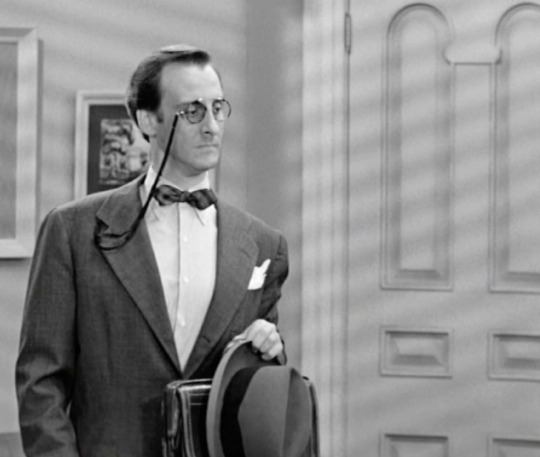
Hans Conried (Mr. Atterbury, George’s Boss) first co-starred with Lucille Ball in The Big Street (1942). He then appeared on “I Love Lucy” as used furniture man Dan Jenkins in “Redecorating” (ILL S2;E8) and later that same season as Percy Livermore in “Lucy Hires an English Tutor” (ILL S2;E13) – both in 1952. The following year he began an association with Disney by voicing Captain Hook in Peter Pan. On “The Lucy Show” he played Professor Gitterman in “Lucy’s Barbershop Quartet” (TLS S1;E19) and in “Lucy Plays Cleopatra” (TLS S2;E1). He was probably best known as Uncle Tonoose on “Make Room for Daddy” starring Danny Thomas, which was filmed on the Desilu lot. He joined Thomas on a season 6 episode of “Here’s Lucy” in 1973. He died in 1982 at age 64.
In a few months, the role of Mr. Atterbury will be assumed by Gale Gordon.
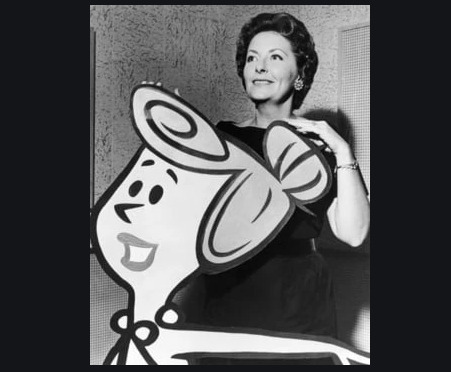
Jean Vander Pyl (Stevie the Baby) is best known as the voice of Wilma Flintstone for the Hanna-Barbera cartoon “The Flintstones.” Coincidentally, Wilma’s best friend was voiced by Bea Benadaret, who will later play Iris Atterbury, Liz’s best friend on “My Favorite Husband.” On radio she was heard on such programs as “The Halls of Ivy” (1950–52) and on “Father Knows Best” before it moved to TV. She died in 1999 at age 79.
Doing baby voices was something that Vander Pyl would also do on “The Flintstones” where she did the voice of her own daughter, Pebbles.
EPISODE
ANNOUNCER: “As we look in on the Cugats this morning something new has been added. There’s a moving van in front of the house next door, but of course the new neighbors don’t interest Liz Cugat in the least!”
Liz is peering through the front window at the goings on next door using George’s binoculars. George gets interested only when she sees fishing and hunting equipment being unloaded.
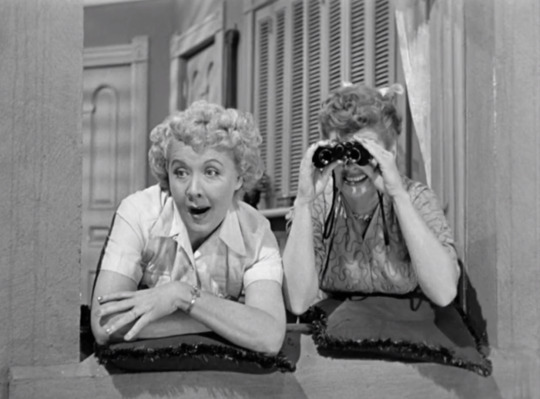
In “New Neighbors” (ILL S1;E21) in 1952, Lucy and Ethel watch new tenants the O’Briens move in using Ricky’s binoculars. Like Liz, Lucy mistakes a bug on the lens for the new neighbor! Unlike George, it is blonde, shapely Mrs. O’Brien who gets Ricky and Fred interested, not sporting equipment.
Cory Cartwright (John Hiestand) drops by for a rare early morning visit. He’s come by to tell George that he is to be the trustee of his mother’s club, who helps an orphan home with 130 children. George makes Liz promise not to go next door and bother the new neighbors while he is at work.
Liz and Katie spend two hours washing windows while spying on the movers. Liz says they moved in a lot of junk.
KATIE: “With women who know junk best, it’s Mrs. Cugat two to one!”

Katie is sarcastically paraphrasing a popular ad slogan of the 1930s and ‘40s for Lucky Strike Cigarettes: “With men who know tobacco best, it’s Luckies 2 to 1″.
Liz wildly figures that if she doesn’t go over and visit the new neighbor she may lonely, take to brooding, become moody and despondent and turn on the gas. Liz rushes off to save her life!
Liz visits the new neighbor (Mary Lansing), who compliments Liz on having two such industrious maids - the ones who spent the two hours cleaning the same window! Before Liz leaves, the woman asks her to babysit with her four month old son, Stevie (Jean Vander Pyl), while she runs an errand.
George comes home early while Liz is still watching the baby, so she tells Katie to take him into the den. George hears the baby crying and goes into the den to see for himself and demands to know who it belongs to.
LIZ: “You wouldn’t believe it’s mine, would you?”
GEORGE: “No!”
LIZ: “Princess Elizabeth’s?”

When Britain’s Queen Elizabeth II was still Princess Elizabeth, she gave birth to Prince Charles, who was born on November 14, 1948, two weeks before this broadcast. Princess Elizabeth became Queen upon the death of her father, George VI in February 1952. Lucy Ricardo performed for her in “Lucy Meets The Queen” (ILL S5;E15) in January 1956. Naturally, the monarch remained off camera.
Liz admits that the child belongs to their new neighbor. Just then the telephone rings and Liz leaves George with the baby to answer it. George tries to distract the child with his pocketwatch, which Stevie promptly breaks. Liz returns to report that Stevie’s mother is delayed and they have to watch the child overnight!
~END OF ACT ONE~
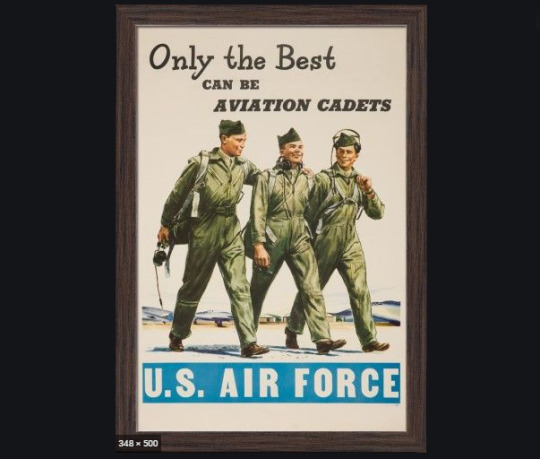
A patriotic public service announcement details how the US Air Force helped a Spanish town remove a precariously tottering statue from a high building.
ANNOUNCER: “And now, let’s go back to Liz and George Cugat and see how they are getting along with the baby.”
In the kitchen, Liz and George are trying to figure out how to feed the baby, not remembering the exact formula. They decide to feed him cereal, instead.
LIZ: “Now which kind do you think he’ll like best? Corn Flakes or Post Toasties? Here’s a good one: Grape-Nuts!”

Post Toasties was a breakfast cereal made by Post Foods as the Post version of Kellogg’s popular Corn Flakes. They were discontinued as of August 2016, although Kellogg’s Corn Flakes are still going strong. Post also made Grape- Nuts, initially marketed as a natural cereal that could enhance health and vitality. It is still sold today.
George thinks they should just feed him baby oil, but Liz correct him that baby oil is not for drinking, but for frying the cereal! They resort to canned baby food, but think it is spoiled because it is all mushy. They settle on milk, but can’t find the nipples, so Liz decides to cut the fingers off a rubber glove instead.
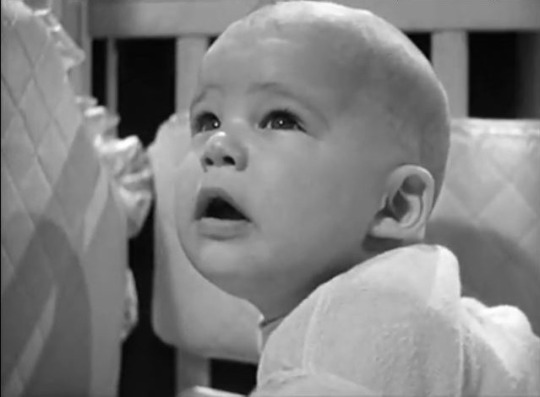
The baby cries all night long. Liz picks him up every time he cries, but as soon as she puts him down, he cries again.
GEORGE: “I know how to make him sleep: ‘Rock-a-bye Baby’. Wait here and I’ll go get a great big rock.”
LIZ: “George!!!”
Liz realizes that the baby can’t sleep because she didn’t burp him. After a few pats on the back, Stevie burps.

LIZ: “Isn’t that cute?”
GEORGE: “Cute? When he does it it’s cute. When I do it it’s vulgar!”
At the bank the next day, Mr. Atterbury (Hans Conried) calls a sleep-deprived George into his office. He tells George that Mr. Brennan, the man from the Orphans Home, is reluctant to make George trustee because he has no children. Mr. Atterbury comes up with a plan. George must rush home to meet Mr. Brennan and pretend that the neighbor’s baby is his own!
Mr. Brennan (Frank Nelson) arrives at the Cugat’s door just as George comes tearing up the walk to warn Liz of the scheme. George gets Liz into the kitchen to fill her in on the plan, but Liz has already given the baby back to his mother. George tells her to get that baby back!

Liz dashes out the back door, tearing her dress on a branch, and stepping in a puddle. Stevie’s mother asks her husband was was going into her house and Liz realizes that Mr. Brennan is the new neighbor and that Stevie is his son. Liz grabs the baby and rushes back home in shambles, hoping that Mr. Brennan will not notice.

But Mr. Brennan sees a resemblance between the two babies and heads home and get his son to compare the two. Liz rush through the back door to return the baby before he can get there. On the way back Liz tears her dress on a nail, falls in a puddle and gets back just in time to find Mr. Brennan at the door without his son!
MR. BRENNAN: “When I got home and took a good look at him I could see: they don’t look alike at all!”
Later, Liz goes to see Mr. Brennan to tell him how wonderful her favorite husband is and Brennan gives George the job as trustee. He asks one favor, however - that they babysit Little Stevie.
GEORGE: “Not tonight!”
LIZ: “No, not tonight. For the whole weekend. Goodnight, George!”
~ END OF EPISODE ~

#My Favorite Husband#Lucille Ball#Richard Denning#Hans Conried#Jean Vander Pyl#Mary Lansing#Ruth Perrott#Frank Nelson#US Air Force#1948#Post Toasties#Kellogg's Corn Flakes#Bran-Nuts#I Love Lucy#Queen ELizabeth#Lucky Strike#John Hiestand
9 notes
·
View notes
Text
Aspects and Narrative Structure
What exactly are Aspects, anyways? Well, in the comic itself, Aspects are forces of the universe that influence and are influenced by the “Heroes” present in the story. But what does this mean on a broader scale? We all have a pretty good idea of what each Aspect represents in canon, but what if that’s not the whole story?
Before we begin, I’d like to direct you to an excellent video by @revolutionaryduelist (optimistic Duelist on YouTube) that will prime you for what I’m about to discuss. I highly recommend checking out their channel, as it’s extremely informative and fun to watch!
So, now that you’ve no doubt enjoyed the video I’ve linked, let’s get into what each Aspect represents in terms of a broader narrative. One of the big narrative themes of Homestuck is that the story is essentially a stage performance, or an “interactive play,” which we see throughout the comic, from the “Acts” and “Intermissions” to the curtains opening and closing on each Act. There are plenty of times where the “fourth wall” is completely shattered, and the layers between the cast and the audience start to blend together. With this in mind, it’s not difficult to reason that each Aspect not only represents a certain universal force in the comic’s universe, but also represents an aspect of narrative structure. I’ll begin with the definitions shown in optimistic Duelist’s video, and then expand upon them from my own perspective.
Let’s start with some easy ones: Space and Time. Space and Time represent the Setting and Pacing of a story. In our stage play metaphor, we can expand this further. Space is represented by the scenery that tells us where the characters are, but it also represents the physical space that the actors take up. Different prop placement, lighting, and scenery can make the stage feel bigger or smaller to fit the needs of the scene, and a change in these things will naturally translate to us as a scene change. Time, on the other hand, is represented by the progression of the story through actions, dialogue, the opening and closing of curtains, and even the music that accompanies each scene and plays continuously during intermissions. In a musical, this is even more obvious, as each song tells a distinct part of the story and opens up ideas about character motivations, illustrates choices, and so on—though this aspect of Time is merely the lens through which these things are viewed, since choices/motivations/etc. are truly representative of other Aspects entirely. As in real life, these two Aspects intermingle considerably, creating “spacetime” as the spatial and temporal backdrop of all the events we witness as audience members, the framework that allows both depth and progression to occur in the narrative and sets the foundation of the stage itself.
Light and Void represent Relevance and Irrelevance. The difference between the cast and crew on stage is easy to tell because the spotlight will always be on a character, not on a member of the crew, unless ironically referencing a crew member (thus breaking the illusion) is a part of the performance itself. Those who are illuminated hold the attention of the audience, and the light allows us to see their facial expressions, their clothing, their movements, etc. and understand the character better through these things. A character who is self-assured may wear a smug grin, holding themselves upright with confidence. A character who is poor might wear old, ragged clothing. Light is all about which characters are relevant, and it also allows the audience to discern information about the characters and about the larger world within the play itself. On the other hand, Void is represented by the unlit areas of the stage, the shadows behind props and characters, and even the crew itself. The ties between Void and the stage crew can be illustrated through bunraku, also known as ningyō jōruri, a traditional Japanese puppet theatre with a long and fascinating history. Puppeteers are clothed in black robes, often hooded, and blend into the black backdrop in order to direct attention onto the puppets themselves and away from their operators. Stage crews in American theatre will often wear dark clothing for the same reason, moving props and scenery as necessary without drawing attention away from the story itself. Although they’re absolutely vital to the execution of the play itself, the crew is in most cases irrelevant to the play’s narrative, thus they work in the shadows to place pieces where they need to be, going unnoticed by the audience.
Life and Doom represent Agency and Conflict. As every good storyteller knows, both of these are vital to the lifeblood of a story, as characters who have no agency are simply puppets, empty vessels with no will of their own, and a story with no conflict doesn’t go anywhere or challenge the characters in any way. In our stage metaphor, Life is the appearance of each character’s free will. Even though we recognize that a script is in place, and the actors are simply working within the framework of scripted interactions, they bring the characters to life through their performances and give the illusion that the world presented onstage is a vibrant one. A good actor can draw an audience into the story by fully embodying the character in question, stepping into the role and allowing us to relate to them, cheering on the heroes and rallying against the villains as the story progresses. We begin to forget that the world we’re presented is mere fiction, and we come out of the experience feeling much different than when we entered. This is what makes a good stage play so compelling, as we watch these characters grow and change based on what they endure and how the world reacts to their actions. In the same vein, Doom is the conflicts, obstacles, and limits placed in the way of the characters to challenge them and help them to grow. In the case of a tragedy, this can also be the end result, whether through a character failing to achieve their goals, a villain succeeding in their heinous plot, or even the death of a protagonist, which removes their agency in the story itself. No real person becomes stronger without facing hardship, and the same is true in fiction. What sort of character would Hamlet be if he wasn’t challenged to find a way to cope with the death of his father, or the knowledge that his uncle was the one who killed him? These conflicts enrich the stories we’re told and provide roadblocks on the road of success, testing the limits of each character’s willpower and strengthening their resolve, or even forcing them to reconsider their goals entirely. There’s no such thing as a free lunch, and these necessary hardships fill out the story itself, ensuring that something is learned through the experience through delayed—or, in some cases, entirely absent—gratification.
Breath and Blood represent Plot Development and Character Dynamics. As the Aspect of movement and change, Breath translates into our metaphor quite nicely, ensuring that the story is as dynamic as the characters themselves. It’s the sequence of events that takes us from exposition to resolution—in essence, it’s pretty much the story itself, which is why John is able to do what he does, escaping from the narrative of Homestuck entirely in order to affect things from the outside. The plot is the engine that drives the story—the twists and turns that the narrative takes as difference pieces take their turns on the board. Character motivations are explored, actions are taken, unexpected events take place, and lessons are learned. All of this happens within the plot, and it’s a very external force, as opposed to what we’ll explore in a moment with Blood, which hones in on characters specifically, rather than the whole narrative. Breath is also represented by change, and any change in motivations, scenery, tone, and even tempo can be attributed to Breath in addition to the Aspects normally represented by those things. Blood, however, is a matter of interpersonal relations between characters in a story: their feelings about—and for—each other, the various factions within a story, and the natural associations one can make, such as “protagonists/antagonists, nobility/commoners, obedient civilians/ruthless scoundrels, and so on. Part of what makes characters so interesting is their dynamics with other characters. For example, on her own, Elphaba Thropp from Wicked is a very interesting character. Blessed with innate magical skills, but cursed with green skin, she is ostracized by many and reluctantly admired by some, and this makes her interactions with others very dynamic. Her insistence on bringing much-needed attention to the oppression of Animals in Oz, social consequences be damned, comes in direct conflict with a character like Galinda Upland, who strives to maintain her place in the social hierarchy, even if that means masking her true feelings on controversial subjects to paint herself favorably in the eyes of others. As the story progresses, the two find that they have much more in common than they could’ve guessed, and they begin fighting for the same cause, shifting from bitter enemies to best friends through the course of a few excellent musical numbers. This shift in their dynamic is vital to the story, yet this is merely one of many such dynamics.
Let’s move on to two Aspects that are a bit more abstract in our narrative format. Hope and Rage represent Coherence and Contrivance. These words may sound quite different from what we’re used to from these Aspects but hear me out, because there’s a method to my madness. A story’s coherence is how well it can be understood, and furthermore, how well it can be related to by an audience. It also represents the enthusiasm with which an invested audience will respond to the narrative taking place. In our stage play metaphor, this is part of what drives us to immerse ourselves in the story. It’s the excitement we feel when our favorite character completes their goal as set up in the exposition, or the fear we experience when an adversary comes close to unraveling it all. It’s the ability to escape from our own lives and enter the world presented onstage, and a big part of why walking out of a great performance can feel like we’re waking up from an intense lucid dream. It’s the magic of excellent storytelling. Hope is what drives us to overlook mistakes, either in the narrative itself or in the performance, and allows us to enjoy it as a whole. On the other hand, Rage’s contrivance delights in tearing open plot holes, exposing the divide between performers and the audience, and dispelling the illusion that the world on stage is in any way “real.” It’s the heckler at a comedy show, or the critics in the nosebleed seats. It’s the breaking of the fourth wall that occurs when a character in the story directly addresses the audience, or begins to critique the narrative itself. While it can certainly seem like a negative force, this Aspect is what keeps us firmly grounded in reality, pulling us out of “la la land” when the show is over and it’s time to return to our lives. It marks an end to the magic, a disbelief in the “miracles,” and the voice of reason.
Finally, our last two Aspects, Heart and Mind, represent Inner Character and Outer Character. This is fairly obvious, given what we already know from canon, and it translates fairly literally in our metaphor. Heart is represented by a character’s “true self,” or what remains the same in every performance of the play. It’s what makes each character recognizable, no matter how the script, costumes, set design, etc. have been adapted. Peter Pan, for example, is always presented as childlike and carefree, bold in his actions and protective of those he loves. He can also be incredibly naive and immature, which humanizes him and allows room for growth. Regardless of which actor might play him, or whether the story is adapted to a sci-fi setting, or tells the tale of a much older Peter, or is even presented from the perspective of an entirely different culture, these character traits and motivations will always be the same. They’re what make him the “Peter Pan” we all know and love. The “true self” involves every trait that is essential to a character. If these traits were changed in some way, they would cease to be the same character, much like adding or removing a proton from an atom would change its element entirely. On the contrary, Mind is represented by a character’s “projected self,” or how they present themselves in the company of others. For some characters, their “true self” always shines through, and they rarely act in ways that aren’t in accordance with their deeply-held values. For others, such as Billy Flynn from Chicago, the creation and maintenance of a constructed, outward “self” is vital to their survival and prosperity, and sometimes deception is the name of the game. Billy, an incredibly successful defense lawyer, comes across in his musical number as a caring, compassionate man who couldn’t care less about money and values “love” more than anything else. This is extremely ironic, however, as the audience is soon presented with a very different view of Billy: as a stern, ambitious man who’s very concerned with money, but also loves the challenge of winning cases for clients on death row. As his “true self” is revealed, his choices and motivations begin to make sense to the audience, and we gain a deeper understanding of the man behind the mask, so to speak.
Each Aspect plays a vital role in the narrative structure of any story—or performance, in this case—and perhaps we can use these interpretations to further understand what our own Aspect connections are. After all, all the world’s a stage, right?
#classpect analysis#classpect#homestuck#classpects#homestuck analysis#optimisticDuelist#revolutionaryduelist#holy shit this took like two hours to write. i need to sleep now g’night
142 notes
·
View notes
Text
Weekend Top Ten #451
Top Ten British Films of My Lifetime
Here we are with another of my semi-regular “this has nothing to do with anything but I just thought about it” lists. Nothing to tie into, nothing to celebrate, just a moderately interesting topic. Hopefully.
I don’t feel like people talk about British films the way they did in the nineties. Maybe that’s just because I'm not a teenage wannabe film director reading Empire anymore so I'm not picking up on a meta-narrative or looking for ways into the industry, but I think it’s more the changing nature of the film “biz”. The nineties proved that there was a functioning film industry in Britain, and the subsequent rise (or return) of huge blockbusters filming here has meant that there’s always a lot of money flowing through British studios and companies. Star Wars, the Wizarding World, and James Bond are just three franchises where, whichever country owns the rights or the IP, there’s still a strong UK flavour to the productions, even if they have American actors and directors. Even indie films get money from all over the globe now, further muddying any attempt to define the nationality of a film. For a long time there, the Coens were making films for Working Title, so arguably they were British films too.
I'm going to insert a depressing caveat here and say that, with Covid shutting the cinemas and the government’s reluctance to offer ongoing support to the industry, there is a chance that our position as a great location or a destination for a raft of production and post-production services may be under serious threat. Like with Thatcherism, we could end up seeing a return to the bad old days of the eighties, when despite stone-cold gems emerging, the industry did struggle. But anyway.
Basically, I don’t always know if a British film is a British film these days, and their Britishness does not get ballyhooed as much as it did 25 years ago. But all the same, for reasons undefinable (because Lord knows I’m not feeling very patriotic at the moment), I have here decided to list my Top Ten British Films. I’ve focused on “in my lifetime” because, well, it’s easier, and there are fewer huge films that I've missed. But like I always say, I'm not a journalist or a professional film critic, so there certainly are some huge films that I've missed. Off the top of my head, three very big films I've never seen are Naked, Sexy Beast and In God’s Country; maybe they would be on the list. Also, with the 2020 of it all, I've seen virtually nothing this year (Farmageddon and – is it British? – Cats are the only Brit-flicks I saw at the cinema before the Dark Times; if you’re after a review, well, Farmageddon is better). But, look, this is my list and It's utterly arbitrary, as always.
Rule Britannia, etc.
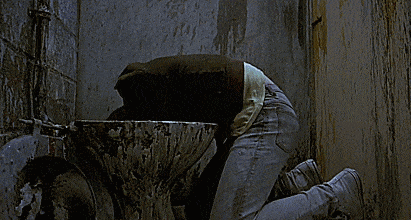
Paddington 2 (2017): yes, it’s utterly delightful, which we need more of in this day and age, but it’s also exquisitely constructed on a technical level. It's phenomenally well-shot, Paddington himself is an extremely good effect, the scripts are tight, the performances spot-on (give Grant an Oscar!)… honestly, this film is perfect. I try to be arch or cynical but I can’t. It's a masterpiece and it does not get enough love.
Withnail & I (1987): as sublime a piece of screenwriting as you’re likely to find, the film is also bolstered with two stand-out performances for the ages (three, really, if you include Uncle Monty). Simultaneously a hilarious character comedy, a gritty but nostalgic look at a lost decade, and an utterly tragic tale of self-destruction.
Brazil (1985): one of those films that’s disturbingly, increasingly prescient. A grim look at the future through a dirty lens, a visual tour-de-force, Michael Palin playing a delightful monster, pathos, romance, tragedy… almost certainly Gilliam’s best film.
Trainspotting (1996): utterly seminal; stands alongside Pulp Fiction as one of the definitive films of my youth. Boyle’s direction is so assured, Hodge’s screenplay distils an unfilmable novel into something utterly cinematic, and McGregor delivers an unforgettable performance. Cool, slick, funny, strange, tragic, and very, very British.
In Bruges (2008): another film with two people swearing a lot and just having terrific dialogue, this time against an ironically beautiful backdrop. A neat character study, great performances, devastatingly sad, just damn funny. Also inspired my wife and I to take a real holiday to Bruges, so top marks.
Hot Fuzz (2007): probably, on balance, the best of the Cornetto Trilogy, perfecting the intense montage-heavy style but giving us a bigger canvas, excellent action, a neat puzzle box of a plot (the forward-referencing is at its peak here), a series of increasingly amazing cameos, and arguably the best incarnation of the classic Pegg/Frost double act.
United 93 (2006): unlike many on the list, not one I’d relish watching again; a blisteringly tense, heartbreaking interpretation of the last moments of flight United 93 on 9/11. Taking something seemingly unfilmable, Greengrass gives us a thriller of the highest calibre, a director working at the top of his game to make something unbearable but unmissable.
Ex Machina (2014): it’s rare that a film can be a tense chamber piece and also a groundbreaking sci-fi and also a great special effects movie, but Ex Machina is that, as well as a directorial debut (Dredd rumours notwithstanding). Gleeson and Isaac are incredible in their cat-and-mouse relationship, Vikander is a revelation as Ava, and the whole thing is shot through with such assuredness, walking well-trod paths but absolutely giving us something new and interesting.
Notting Hill (1999): I kinda had to have a “traditional” romcom in here, of the kind popularised by the writing of Richard Curtis; I think common logic says Four Weddings is the best but I’ve always preferred Notting Hill as it’s simultaneously more focused (just dealing with Grant and Roberts) but also has a bigger canvas as it touches on celebrity and fame. As a piece of popular writing it’s exceptional; funny and genuinely romantic and moving, with a great central couple you’re always rooting for.
Brassed Off (1996): sneaking into my Top Ten, displacing the likes of The Descent, Richard III, and 12 Years a Slave, simply because its message of resilience in the face of governmental cruelty and its quiet depiction of nurturing northern socialism is striking a chord at the moment. Stephen Tompkinson should have been able to launch a Hollywood career off the back of this performance, and the late, great Pete Postlethwaite is a beacon of tragic, stoic heroism, especially in the climax of the film. The Fully Monty went into similar areas to greater financial success, but Brassed Off is the sadder film, the film that stays with you longer.
Right, there we are; a definitive list. Sorta. I’m kind of surprised there are so many relatively recent films up there; I thought it’d be full of stuff from the late eighties and mid-nineties (I’m note sure why I feel that “mid-nineties” needs a hyphen whilst “late eighties” doesn’t, but there you go). As I flicked through my mental album, however, I realised that a lot of films from that period I hadn’t seen in twenty years or more, and I just didn’t feel like I could justly rank them; A Fish Called Wanda, Time Bandits, The Company of Wolves, Educating Rita, The Cook, the Thief, his Wife, and her Lover, Secrets and Lies, Mona Lisa… all of these might have been included if either my memory was better or if I’d whacked a DVD on more recently.
Anyway, there you. Brits are good at some things. Obviously those things don’t include feeding hungry children or successfully negotiating international trade agreements, but there you go. Can’t have everything.
#top ten#films#movies#british films#cinema#paddington#withnail#richard curtis#edgar wright#danny boyle
2 notes
·
View notes
Text
There are times when we get caught up in black and white, either/or, and all or nothing. We forget sometimes to breathe, step back, and find the gray in between. Sometimes we recognize that those hard lines in the sand are drawn more out of habit than any concrete reasoning we can immediately muster, and that there isn't really a justifiable reason to place such great emphasis on separating the thing in question in the first place. Opinions on evaluations of fictional characters are held in extremes as marks of character and points of contention within fandom far and above what they usually should be.
For many, fandom is a form of escape above mere entertainment. Comfort characters garner a following of people who often share enough commonality to bolster each other and bind them together in support as they cheer on and vicariously live through each and every one of that character's victories. Occasionally, though, these characters can end up having the exact opposite effect.
Even putting my personal feelings about Takami Keigo aside, I've always been fascinated by what he objectively is as an anime character. Though I fully recognize that removing myself from the equation is difficult, if I had to put my impression of what he is in the industry into words I'd say he feels like lightning in a bottle. It's not often in anime I find a character with such an appealing and striking visual design within his own series and next to characters of any other series, alongside such an endearing and clearly defined characterization in the way he's written and the way he acts - the whole combination of which is more powerful than the sum of its parts is something I can only describe as plain and simply "appealing" - and the mundaness of the word betrays the profound extent to which that definition applies. Almost anyone in the world could look at that character with no prior knowledge and say and say, "I like him." Almost anyone who might venture to look a little deeper would probably say at the very least, "Yup, I can appreciate that character exists" even if it stopped there.
There's likely far more of these kinds of characters in anime than I give them credit for, but Hawks has struck a chord with me in particular that resonates far more than most other examples I could think of. He's done the same with many more, I know. I am not the only Hawks-centered meta/analysis blog on this site alone by any stretch of the imagination. I wouldn't be surprised if my own more-often-than-not, self-indulgent interpretation of events has however many more rolling their eyes at my work. I experience the same thing myself on occasion in regards to content I disagree with (all in good faith, please understand - we all have different tastes and viewpoints and that's a good thing), but in this particular context I find something exceptionally bittersweet in it.
For some, it's simply bitter because they place an emotional stake in the ultimate fate of Takami Keigo far above what I do - something that's much more personal and valuable than I often realize; or maybe I do, but those reasons why simply strike far more deep and personal for others than I can personally relate to.
From the very beginning Hawks has been framed in the moral gray of the greater context of the My Hero Academia lore. He is not all good but not all bad. The way he interacts with others comes across as cold and calculating, but his inner thoughts betray a warmth and depth that's deeply endearing. The contrast of the massive good he seeks to do despite the profound wickedness of his upbringing has captured the hearts of many and has them thinking more or less the same thing, "This character has such an undeniable amount of good in his heart that he deserves to end up happy after all the pain he's been through."
"He deserves to be free. He shouldn't have to be alone anymore. He should do what makes him happy, not anyone else." Every single Hawks fan I've heard from has echoed these same core sentiments, though it's taken many forms.
Herein lies the near paradox of his fanbase, ironically befitting his ambiguous nature: the very traits that endear him to individual fans are often the context and lens by which they define the key to the ultimate happiness they want for him, and that spectrum is a wide one to the point of having one of the most diverse dedicated fanbases to a single character I've ever seen.
Just as an easy example, for someone who latched onto the fact he was used like a literal tool for others' gain, they may see the key to Hawks' happiness in rebellion - kicking the system, fighting the man, going apeshit for once next to people who also are tired of being trampled over.
For someone who recognizes his unwavering desire to do good and help others despite his developmental environment may see him being handed the reins of his own life back to him as his ticket - to have the choice of saying yes or no, to be able to keep going or just fly away merely because he wants to.
I have to pause and emphasize that they key to understanding both perspectives is catharsis for the audience in question, and while I have my own opinions as to which is more befitting to the character as written, I am placing equal emphasis on both interpretations as valid reasons to root for the ultimate outcome in each scenario.
This is all in response to comments I've received thanking me for being so steadfast and vocal in my insistence that while Hawks' formal allegiance may change, his heart and the way he feels towards heroes in general will not. I may have my personal preference and own interpretation of what that will look like in the end, but the key takeaway is that I don't see him bucking the entire heart of the hero movement in hopes to get back at the Hero Commission.
However, that isn't to say I don't understand or look down upon those who either genuinely have come to a different conclusion or would just rather see it happen because it would be more satisfying or interesting for them in particular. I also wouldn't be sore if it ended up coming to pass assuming the buildup to that point felt appropriate and genuine as I don't see it as an impossibility for his character. For me, it doesn't have to be a point of contention driving a wedge between different Hawks fans.
So if you ever feel frustrated or upset at the amount of support in your preference or lack thereof in your desired direction, don't let it get to you. While others have their own reasons for wanting the ending they want, the overall result they want from him is more than likely the same as you.
I asked a completely informal poll giving people an either/or ultimatum for where fans personally wanted him to end up, purposely leaving out a potential third option; but the replies I got overwhelmingly echoed the same one regardless of the false either/or I intentionally planted, "I have my preferences for where I want him to end up, but really all I want is for him to be free and do what he wants in the end because it's what HE wants to do."
That's amazing!
Simply by virtue of my own audience or the way it rippled through the community it could be biased in any direction, but when at least HALF of the total responses say, "Neither" in some capacity regardless of a forced preference I think it's safe to say that we all have a lot more in common regarding this character than we often realize, and he isn't even real!
Hawks was always gray on purpose, and I really hope at the end of his arc we get something that pulls together and unites the other characters in the series as well as the fans because I think that's the point of his character to begin with. I doubt everyone will be completely happy with the outcome off the bat, but as long as it's genuinely satisfying from a character development standpoint I hope we can pull together in support knowing we can't always get what we want, but it was a good run - plus there's always fan fiction for when the author got it wrong!
For real, though, let's get excited together. Find your corner, but follow the character not the crowd. You don't have to think of them as perfect, and sometimes the characters that even end up disappointing us the most stick with us longer. We can always dig a little deeper to find out why they did what they did, or why we want something so badly for them, and even just acknowledge when we just want what we want because we want it. That doesn't make us bad people or bad fans. Fiction is usually written to be enjoyed - HeroAca definitely not an exception to that general rule - and tastes in entertainment vary far and wide. Any one series with that variety of expectations aimed at it just can't satisfy everyone so I'd personally rather it stick to the story it was trying to tell from the beginning instead of succumbing to a popularity vote, even if I didn't get the ending I wanted.
I just hope this was a comfort to some of you and an olive branch to others in case you were feeling down about how others viewed your comfort character or just caught up in another ultimately pointless fandom war because it happens. Maybe we can even use it as an exercise to see things from another viewpoint to understand their perspective and realizing it's okay to agree to disagree. I don't want to put this in the character tags because I think there are plenty that don't need or want this content but still those that do who will find and share it in confidence. This isn't about sides or even being right. Let's enjoy our favorite character together and watch him be happy in the end, however that ends up being.
13 notes
·
View notes
Text
THINGS I LOVED ABOUT AVENGERS ENDGAME
SPOILERS.
Based on the amazing post by @saieras (21 things I loved about endgame), anything pushed by blockquotes (the little line on the left), and some of the titles, come directly from said post --DISCLAIMER -- and means I agree completely.
1. THE FIRST 20 MINUTES
Expectations? Chuck them out the window. They weren’t kidding when they said all promotional material came from the first 20 mins!!! I loved how they got right into the thick of things, cameras blazing, completely no nonsense. And CAROL omg. Also I did NOT expect Thanos’ death to be, Just Like That.
CAROL, again.
2. THE TIME JUMP
Very, very smart move. I liked everything about the time jump. It lets us view the event with a lens of a world shattered, a world that has had the chance to come to its senses and reel from the catastrophe.
3. TONY CONFRONTS STEVE
I have firmly been Team Iron Man since Civil War, and Tony is my favourite character (I am not okay), so suffice to say that I loved how, even weakened with malnourishment, he got in Steve’s face, and everything he said.
4. THE LANGS
Just. Every joke he made. Fantastic.But also I did not expect to shed my first tear at his and Cassie’s reunion. That was great.
5. DOMESTIC TONY
Tony and Morgan. Such a real, cute father-daughter relationship. ‘Mommy send me to rescue you’ and ‘Love you three thousand’ filled my heart with joy.
6. INTERN
Tony and Peter’s photo (...) AND THAT PHOTO WAS HIS. In HIS HOUSE. FRAMED. I REALLY wish we got more but that moment was very powerful. Still, I was unsatisfied. I wanted Tony to cry. I wanted Morgan to also know about Peter. Basically I want more canonical proof of Irondad Spiderson. Like, listen, this is the one loss that haunts Tony to this day. Peter’s death was the kind of pain that made Tony terrified of going again, for fear of losing Morgan
7. THE NYC SCENE
ALL of it. From Tony the security guard, to him talking shit about his own deodorant, to him giving himself a cardiac arrest to cause a diversion and being like this is fine, nothing to see here. And Hulk vs stairs. And STEEB. OMG STEEB. “Hail Hydra.“ “I’ve got visuals on Loki.” “I can do this all da–“ “Yeah. I know. I know.“
“Bucky… Is… ALIVE“
And butt jokes. So many Steve buttjokes. I don’t ship stony, but that is the closest y’all will get to a stony suggestive scene.
ALSO LOKI just yeeting himself outta there. That’s ma boi!
8. FRIGGA AND THOR
Nuff said. Mama Frigga is the best.
9. TONY AND HOWARD
It’s really great how adorable Tony was throughout this scene. And… while Howard was NOT redeemed, it’s nice to know he did love his son. And it’s great that Tony got some closure.
10. PEGGY AND STEVE
Out of the Big Three’s scenes with their “significant past people”, this one was the least impactful for me, as they didn’t even talk, BUT in retrospect it set the scene for later perfectly.
Also because I don’t much care for Steve.
11. GAMORA
This is GREAT and showcases her character very well, who she really is despite who Thanos raised her to be.
True, the minute she realizes Thanos’ plan is to wipe out half the universe, she is so clearly appalled (I don’t think she really knew what he planned for after he gathered all stones), and immediately starts to reconsider her position on the whole thing.
12. CLINT AND NATASHA
Their friendship was on full display during this film. Their scenes. And how it was all platonic. The entire audience knew, as soon as they landed on Vormir, that one of them wasn’t going to make it.
- I knew it would be Natasha , though, Clint and his family, and Natasha and her whole “I need redemption, I’m still trying to be a better person” -
Back to the Vormir scene: it was amazing, and heartbreaking, the lengths they were willing to go to make sure they were the sacrifice, like, how they were willing to injure if it meant the other were alive at the end. Clint and Natasha were never my favourites (except around Avengers), but I will forever applaud Scarlett Johansson and Jeremy Renner for their outstanding performance.
13. THE BIG THREE FIGHT THANOS
Thor’s lightning and Tony’s Iron Man tech combining to kick purple ass, all of three of them holding the titan back while the others tried to crawl out of the rubble. Still, the “big three fight” was mainly focused on Steve, in my opinion.
Like previously stated, I’m not a greeeat Steve fan, but even I have to admit that Mjölnir zapping to his hand at that precise moment was awesome. I cheered right along with everyone else. Which also justifies Thor grabbing it along from the past and possibly, maybe, most likely, leaving his past-self without it?
Anyways, cue tears at each shard of the shield.
14. THE ENTRANCE OF THE HEROES
If I was crying before, the moment that Sam hails Steve, and Shuri, Okoye and T’Challa walk through that first portal I was outright sobbing.
Words don’t do justice to the emotion I felt at seeing ALL my heroes assemble for the last time. At each new face I cried harder. They didn’t forget anyone and that made me so fucking happy.
I felt as if I could climb into the screen and fight alongside them, I felt powerful enough and fired up enough to do it too. And that’s the magic of that scene, thank you cast and crew. Thank you MARVEL for the incredible build up, I thought it was worth it.
15. PETER AND TONY
How Peter goes straight for Tony and cute rambling mode is already turned on, but Tony can’t even speak, and just falls into the hug in a parallel of their “hug” in Infinity War.
“Oh, this is nice!”
The moment is essencial since Peter, and not really any of the other tens of trillions* that vanished in the snap, is the reason Tony embarks in the time travel venture, even when it could’ve cost him so much. So it validates his choice, besides his being, you know, a true hero.
16. CAROL’S ENTRANCE
I missed her in this movie. I mean, I thought she would be in almost every shot, but maybe that was just because I think she’s fantastic. Her entrance, tho.
“What are they shooting at?” “Something just entered the atmosphere”
And then blast! Singlehandedly destroying the mothership (Thanos’ looks so fucking offended and we can see any conviction of victory waning from his expression), and kicking some ass. Way to establish dominance early on girl!
I mean, I played with the idea of Infinity-War-Thor being equal to Carol, (and maybe, maybe, he could’ve come a close) but now? She’s so clearly in another level... No words except: goddess.
17. PETER IN THE BATTLE + CAROL
Instant kill mode
So proud of him. The way he flips in, and is instantly like Woah this is a Big Fight!!
“Hey Peter Parker. Got something for me?”
CAROL. CArol listen. You are his mom now. That’s how it works with that damn kid. (...) It be like that sometimes.
I don’t think Carol would ever be around enough for anything close to parental relationship (plus, May is Peter’s mom), but that boy will worship the hero-shit out of Captain Marvel.
18. MARVEL’S HEROINES
If my crying had eased a bit from the general assemble moment, I fucking cracked again here. They are so tough, and powerful, and beautiful.
As a woman, it was so damn empowering and important to see all of them up there, together, each with their own background and their own strengths. I love how we had all kinds of women - warriors, mothers, princesses, generals, wives, captains, businesswomen, scientists, girlfriends, assasins, friends, witches - and all of them fighters.
I also can’t wait for the gifset and the final still - it’s gonna be my background for about everything.
Also RESCUE. OMG. PEPP. And the battlefield fighting side by side with Tony.
19. TONY’S SEND OFF
His death. I was glad Pepper was the last one there, to tell him it’s okay, they’ll be fine, he can let go.
AND PETER. Peter was there, trying to talk to him, sobbing and breaking down. This is what I wanted, going in, if Tony were to die. And this is what I got. You just know this is going to haunt him in FFH.
And Tony himself. His immense sacrifice, the moment he knew what he had to do, the moment Strange held up that finger. One way. UGH.
Of course I knew Natasha wouldn’d be the only one to die, but damn, I’m still feeling the hole his amazing fictional character left/ is going to leave in my life. Literally the only one (Peter was of course safe with Far From Home around the corner) I didn’t want to die. I loved him before my heart was inflated with Stark-family feels.
The lake house was so peaceful and I loved how it showed that after all his trouble, his PTSD, Tony had found a home and a family (even if somethings haunted him).
The picture, and how devastated Peter is can only mean that between Homecoming and Infinity War they grew closer, which had always been what I wanted. But I wanted to see it! Fanfiction will have to continued to lull my pain, I guess.
Speaking of fanfiction, Harley being at the funeral is all the proof my little fanheart needs to claim they’ve not only been in contact through the years, but had a mentor/parental relationship as well.
The question for me now is: how well do the boys know each other?
20. AND FINALLY, TONY. RDJ.
Thank you. Beyond all words, Thank you.
This has been one hell of a ride.
FOREVER IRON MAN
14 notes
·
View notes
Text
Avengers Endgame: A (Late, Incredibly Long) Spoilertastic Review
Well, it’s done.
I did it. We did it. We all watched the original lineup of Avengers’ stories come to its end.
So what did I think?
It was phenomenal. A worthy ending to a more than worthy series of films and stories.
There are just so many things to go over and so many points to hit that I have to warn you this review is likely going to be just as long as Endgame’s running time, so strap in.
Overall Grade: A-
Naturally, spoilers below.
I’m taking a note from a friend of mine and have decided that due to the film’s epic length and its history, the best way to tackle my reactions is first per character, and then I can evaluate things like plot and story and action. Just a heads’ up. So here we go.
Tony
Christ. I…wow, where do I even start?
There’s just so much to talk about with this movie and the arc that Tony Stark has been fulfilling since his first film. I almost don’t know how I can even put into words what I feel for this character. Tony came to us as this swaggering, arrogant diva, and yet the first Iron Man breaks him down to his core character. Tony Stark is a man with everything and nothing. He has the looks, the intelligence, and the resources to have everything a person could want, and yet he has no family and no deep connections with others aside from Rhodey and Pepper when it all starts. The core of the MCU was very cleverly built around the theme of Tony’s heart, and that’s perhaps why so many of us are devastated to know his fate. We all saw it coming. There was sadly no other way Tony’s story would pan out if we wanted to stick to his full arc. Tony could not rest until he knew the universe would be safe, and he made sure it would be before he left us. His legacy is incredible. It’s so…hell, to use a bad pun, heartwarming.
I guess the best thing to do in order for me to not just recap every amazing thing he’s done since Iron Man is to recap moments in Endgame for Tony that leapt out at me as exceptional:
-The intro with Tony playing paper football with Nebula. Stab me in the heart. That was so cute. It’s so very like Tony to try and keep her strong and keep her spirits up when they were literally staring death in the face. It was unexpectedly adorable, and even without us having seen the days they spent together, you could tell that Tony treated her in a mature-ish fashion and that’s why Nebula appeared to be affectionate, or at the very least, respectful towards him when she is usually very distant. You could tell they totally depended on each other and it was an important partnership. I was very, very touched when she scooped him up and put him in the seat when they were approaching their final day together. It’s such a powerful thing to see how far Tony has come, through the lens of Nebula showing such compassion for him even in such a short amount of time. I love how the Russos are so good at conveying thoughts and emotions and story without saying it outright. It’s an amazing skill in filmmaking.
-Tony’s arrival back to earth, and his confrontation with the Avengers. Ow, ow, ow, ow, ow. My fucking feelings, y’all. Christ. I mean, the Russos already know how to gut-punch you and then kick you when you’re down, but Tony’s complete and utter break down still hurts like a mother. It’s just so raw and emotional, and it should be that way after a loss on this kind of scale. What really tipped me over into choking down frustrated tears was that Tony just looks at Cap desperately when he stumbles off that ship and says in this broken voice, “I lost the kid.” He can’t even bear to say Peter Parker’s name. The shame and loss and guilt is too much for him to say his little Spider Son’s name. Oh, fuck you, Russo brothers.
And then the team being in utter shambles over losing to Thanos, all of them just barely holding it together, and then Tony just shatters. He’s home and he’s with family, but he can’t get over this kind of failure. What really tears it is him going after Steve so viciously, and it’s so complex. He’s angry at himself, and he chooses to direct that anger at Cap because we all know Tony took it as a personal loss, as all of them did, that he couldn’t stop Thanos even though he literally gave it everything. He gave every last bit, every last drop, of effort, and he couldn’t stop Thanos. It just hurts. And the resentment that was already between Cap and Tony after Civil War is still clearly there, so the entire scene is just like being dragged naked over broken glass. RDJ and Evans’ acting here is some of the best of the entire series in this scene. It sets the stage and reminds us of the stakes amazingly well.
-Tony’s post Snap life, and his interactions with his family. All of us Tony stans called it that Tony would be a phenomenal father. He’s already shown us that he can be the right amount of strict and caring, and everything with Morgan is exactly what I dreamt it would be. I could rewatch the scenes with Tony and Morgan a thousand times. People can shit on Tony all they want and I will never listen to them, because it’s so apparent how much and how deeply he cares in scenes like this. Where he confronts Pepper after he figures out the time heist equation. Years ago, Tony may have lied to her or made a decision without consulting her, but Tony has grown as a person and he approaches his wife with one of the most important things he will ever do in his life and he asks for her opinion before he does anything. It’s such a good comparison to how he used to be. Tony’s heart is so huge in this whole sequence. It’s such a good representation of his internal battle between doing what is right for everyone and doing what is right for him.
-Tony and Cap’s reconciliation. Oh, my heart. I love how Tony approaches it in such a Tony sort of way, forgiving Cap and agreeing to move past their resentment for what happened in Civil War. I like that it was done in a brisk sort of way, and that a lot of the power in the scene comes from RDJ and Evans’ facial expressions. Really, these two act off of each other so well that part of why we’re all crying so hard about this movie is the horrible knowledge that we don’t get to see them act opposite each other in this context. I pray they stay friends in real life, and I would love to see them reunited on screen someday. It’s such a great relationship and it’s at the core of why this is such a great film series.
-The New York heist. Oh God. I can’t wait for them to tell us if the comment about Cap’s ass was in the script or if it was an improvised line by RDJ or Paul Rudd. It is by far one of the funniest things ever to happen in the MCU. Dear God, I was howling. The best part is that during the premiere we were all laughing so hard that I missed Cap’s initial reply, which was, “No one’s asking you to look, Tony.” Christ, I can’t deal. I know it’s straight up Stony pandering but I don’t give a fuck, it was hilarious. And it’s a very meta joke since Chris Evans’ gorgeous, flawless body is a meme thanks to his Dorito proportions (if you haven’t seen that yet, oh god, please look it up) and the fact that he has an absolutely phenomenal ass, especially for a white guy from Boston. Anyway, Tony and Scott’s whole interaction was perfect, and I loved how the scene went and how it led into the next one.
-The army base heist. Tony running into his father was such a good twist. I absolutely did not see that coming, but it was a really welcome conversation to give Tony closure. He’s felt so guilty for how he left things with them, and it was so touching to see him get a second chance at it, even if Howard was none the wiser. I really hadn’t expected anything like that, but it worked well with Tony’s arc and I thought it was very sweet.
-Tony’s reaction to seeing his baby boy, his little Spider Son, running up to him. My God. This was everything. I am a hardcore supporter of the Iron Dad and Spider Son dynamic, and this was the reunion I so sorely needed after the sick, demented, painful scene that was the final moments in Infinity War. Like the rest of you, the level of trauma that hit me when Peter Parker died is just…hell, infinite. The pain was just infinite. I both love and hate Tom Holland and RDJ for doing that shit to us. I did not know I could cry that hard about a fictional character, but I openly wept to the point of sobbing when Peter Parker died in IW, and to see him back in this scene was so wonderful. In my second viewing, the audience actually clapped when Peter swung through the portal, and that was quite sweet for me to experience. But back to the point: once again, I have to simply compliment RDJ’s acting. This is why we love him so much. It’s not even about the big, loud moments. His acting is so precise that the flurry of emotional expressions that Tony went through when his tiny son helped him up and started excitedly babbling to him about being dead, of all things, and then Tony just doesn’t even interrupt him, he just walks forward and pulls that little boy into his arms and holds him tightly in a hug and it’s just…wow. This is some spectacular acting on both their parts, and it heals a really wounded part of my heart, even though the next scene I talk about just breaks it all over again. Plus, at the time I wrote this review, the Spider-Man: Far From Home full trailer just dropped and (SPOILER ALERT) the opening scene is Peter Parker and Happy mourning Tony and I just feel like someone hammered a stake into my chest. This scene is so fantastic. It’s just another reminder of how damn much Tony Stark cares about the people around him and that he has an actual family now, and that’s why the next scene is possibly the saddest one of all.
-Tony’s death. Like Loki’s untimely demise, I knew this was coming from years and years of being a writer. Based on the track for his character arc and because RDJ announced this is his final official performance as the character, I knew Tony was going to die. There was no way around it. His determination to save everyone and correct the wrong done to the universe by Thanos would drive him past his limits and cause him to sacrifice it all. It’s just…man. I wish it had ended differently for him. Anyone who follows me on Tumblr knows that I tag all Iron Man posts with “we stan Tony Stark in this house” and that is how I feel. While Tony is not my favorite Avenger, I will stand up for him all day, err day. Tony Stark is the epitome of the human spirit, and in a different way than Cap, if you ask me. Tony is all of the dark and seedy parts, but also the defiance and the self-deprecation and the obsession and the power of the human spirit. He has so many vices and yet so many virtues. He cares to a fault. He blames himself to a fault. He has come so far after that brutal conversation in Avengers when Cap accuses him of not being the man to lay down on the razor wire and let the other guy crawl over you. He made the ultimate sacrifice play. As much as I reject the idea, we all knew it had to be him. It had to be. Because at the end of the day, Tony’s need to make his family safe was more precious to him than his own life. He gave up a future with his loved ones to make sure Thanos could never hurt them again. And all of it was capped off with a line that will probably haunt me forever, of Pepper’s soft, forgiving goodbye, “You can rest.”
-Tony’s farewell message to his family. Want to know something crazy? I cried so hard at the premiere. So hard. I was almost dry heaving with how hard I cried at Tony’s funeral. But then I had a week of time and I saw it again this past Sunday. I was choked up during his death but I didn’t shed actual tears this time until “I love you 3000.” Somehow, it didn’t hit me until the second time how they filmed Tony’s goodbye to us. They shot it in such a way that as he leans down to turn off the recording, he’s actually looking at us. Not directly into the camera, but so close to it that it finally hit me that this was RDJ’s goodbye and thank you to the fans. It was so touching and sincere that I finally broke down and actually cried again. What truly hurts is knowing that his loved ones have to be without him, and even though his sacrifice means everything, he is going to leave behind such a void. Even with his problems and his flaws, Tony was a damn good man and he was the right choice to begin this epic series. I can’t express how much I am going to miss him and how much I am going to miss RDJ in this shared universe. He’s so charismatic and wonderful and complex. It was not only a comeback for Tony Stark, but a comeback for a very troubled man, and it’s come full circle that Tony had a loving family just as RDJ has a loving family after his checkered past. To be honest, I’m likely going to do as I did for Loki and have a cutoff point in my brain for the MCU, where I don’t accept what happened because it’s too painful. I just pretend that nothing happened after that hug with Peter Parker and they all won the day and no one died. That’s just how it’s gotta be for me to survive a post Endgame world.
Thank you, Tony. You gave everything. I love you now and always.
Thor
-Thor executing Thanos. Standing. Fucking. Ovation. Right, so, I know that Thor probably should not have outright killed Thanos before they had more information, but at the same time, there was nothing more to get out of that son of a bitch and I clapped when Thor swung Stormbreaker and lopped that mo’fo’s head clean off, and I flipped off Thanos’ corpse with both fingers. Good boy. He told you he’d kill you, and he killed you, you sorry bastard. A+++
-Thor’s depression and weight gain. Alright. *rolls up sleeves* Time to make some enemies. I think Fat!Thor is a great idea, but the execution could have been done better. I recognize writing tricks when I see them, and Fat!Thor seems to be two ideas in one, and one of them is what is bothering the semi-reasonable part of the fandom. What I’ll do is explain my take on both parts of the overall idea.
(1) Thor’s depression at his failure (at the time) to reverse the Snap and save everyone is 100% accurate, in character, and is damn good writing. Thor has never actually full-on failed at anything in his life. The closest he has come is between being cast out in the first Thor movie for being irrational and cruel, and in Ragnarok where he had to let Surtur destroy Asgard in order to save his people. Even then, Thor lost battles, not the overall war. Therefore, Thor does not understand how to process failure. Yes, he also failed to save his mother, but at the same time, it’s not a failure on this level. He lost Frigga, Loki, the Warriors Three, and Heimdall, but this was literally trillions of lives that he feels were weighed on his shoulders, and his shoulders alone, even though as Rocket pointed out, losing the war was the fault of a LOT of people, not just Thor (and not Starlord either, you bunch of whiny hypocrites in the fandom, ugh). So becoming an alcoholic and giving up on his life as a hero is definitely how Thor would handle things. Think about it. He no longer has any guidance from his family, or his best friend, since they died. All he has is his Avengers family and Valkyrie. I’m sure the Avengers tried to talk him out of it to no avail, and that’s a really sad thing to know, that they couldn’t get him out of his depression spiral, so they let him wallow in it. As for Valkyrie, she’s still just barely recovered from her own trauma, and I am sure she probably tried to snap him out of it too, but he was too stubborn to listen. What I like about this point for his character is that Thor is right—he has always been expected to be “worthy” and to be the savior. Thor is the big gun on the team alongside the Hulk. He has always been the bravest, the noblest, and the most powerful person on the team, and he is expected as a king to win the day every time. But he lost. And he can’t reconcile it since he has always triumphed in the end. So it’s very understandable for him to lose control and just want to have nothing to do with the hero business, because if you fail once, you can fail again, and he couldn’t bear the thought of failing again, not after it cost him literally everything.
(2) Fat!Thor was an easy source of cheap laughs to keep the mood from getting too dark considering the subject matter handled in this movie. I am of two minds about this issue. On the one hand, I can see why certain people feel that this is fat shaming. It is. But the problem stems from the fact that the fat shaming is still a large part of American culture, and people have not broken the bad habit yet, and so it gets shifted into the easy laughs category. The easy laughs are for the Average Joe viewer. It’s for people who aren’t as conscious of how it sounds to mock him for his weight gain who are just used to “ha ha, fat person jokes.” Some fans felt uncomfortable that he was the butt of a few jokes because a lot of us who suffer from depression know that this is in fact a side effect. When you’re depressed, it’s easy to stress eat and overeat, and you lean heavily towards comfort foods that cause you to gain weight, and your depression makes you tired, so you also don’t exercise and that’s how you can end up overweight. On the other hand, while I agree with these folks about not liking the fat jokes, I also think it was necessary to show a character we all admire falling into the same pitfalls that we as mere Midgardians deal with on a daily basis. I don’t like the jokes, but I do like Fat!Thor’s inclusion in this story because people need to realize what depression does to a person. It shouldn’t have been handled this way, but from a strictly observer perspective, I understand why they went for the low hanging fruit. People needed to laugh since Endgame has very, very dark elements to it. I would have preferred they approach his weight gain in a more dignified fashion, but not every part of this movie was written for me and I sadly have to accept it. That’s my feelings on it.
-Thor’s encounter with Frigga on Asgard. I. FREAKING. LOVE. THIS. I did not see it coming, and I love it with every fiber of my being. This is such a heartwarming scene. I want to rewatch it a thousand times. I love Frigga immediately knowing what’s up (she’s not stupid and of course she noticed and it’s everything to me) and I love that she can clearly see how distraught her beautiful son has become. I love Thor having a panic attack, because that’s extremely realistic after he’s gone so long not having done any hero work, per se, and having to face his previous failed relationship with Jane, and with facing the day his mother died again. It’s really compelling writing. Frigga’s gentle reassurance is exactly what he needed, and it’s exactly what we needed to see him go through. He had to let go of the expectations piled upon him and accept himself for who he is, not who he needs to be as a warrior king and an Avenger. While I do wish they had gone on to show us a little more of who he considers himself to be instead of who he is supposed to be, I am really excited to hear Chris Hemsworth is one of the Avengers who has chosen to stay past the end of Phase Three. He’s young and funny and vibrant and I think Thor is his best role of his career anyhow (no offense meant, Hems, if you ever read this, you handsome golden retriever, you). I think exploring Thor’s personal goals and future will be very interesting.
-Thor’s reaction to Natasha’s death. This is a very small moment, but I actually like it a lot. I like that Thor’s optimism here is a form of denial. I like it because there are certain Avengers who despite the 11 year saga have not interacted with each other much, and Thor and Nat are probably my leading example. When it hit him that they couldn’t use the time stone to bring her back, the loss and devastation on his face almost made up for the fact that Thor and Nat have almost no lines with each other in the film series. I like it because it hurts and because it shows that she does matter to him, even though they don’t interact. It’s a nice detail to include since I was often a little sad I never got to see these two have dialogues. I personally have even written a bit of fanfiction about what their relationship could have been like, and I think it could have been sort of brother-sisterly. It’s a shame we won’t get to see it, but I like that it is given attention here at last.
-Thor wanting to undo the Snap. Yes. This is a very good character beat for him. Again, I agree it’s annoying he ends up getting another fat joke thrown at him (nice work, Rhodey, sheesh, it’s not like the poor guy was traumatized or anything), I like that Tony talks him down. I like that Tony doesn’t think he can’t do it, he’s worried that Thor is in so much pain that he shouldn’t try to make such a rash decision that could cost him his life. Tony seemed dismissive, but I think he was trying to protect his friend more than anything else. I think Tony also knew that it would be rough if Thor either died or became permanently crippled by undoing the Snap. Being able to fight is extremely important to Thor, even with his depression, because Thor is essentially a space Viking. It shows that Tony is aware that Thor’s not just bumbling around as a chubby drunk, but he’s legitimately in pain and he needs to take things slower.
-Thor giving Valkyrie the throne. First off, I need to sling salt at the freaking part of the Thorkyrie fandom that is somehow complaining about this scene. Are you kidding me? What movie did you watch? This is the ultimate freaking Thorkyrie scene, you bunch of whiny nincompoops! Thor literally gave Valkyrie the throne because she is so smart, powerful, and kind that he trusted her to take care of the people he loves with all his heart. The amount of trust and respect that is in this scene makes me want to just squeal for hours. I can’t handle how affectionate and reverent Thor is as he gives Valkyrie the throne. I love the long gaze they share. I love the handshake. I love that Val asks when she’ll see him again. I love that Thor has faith in her and how she will lead his people. Anyone bitching that this is an anti-Thorkyrie scene did not see the same movie we did, and you can all piss off. I love this scene to my core. I love seeing Valkyrie being assured to be a relevant part of Thor’s story and that it likely means Tessa Thompson is going to join us again for either Thor 4 or Guardians of the Galaxy 3. I am a giant freaking fan of her character and I can’t scream “SIGN ME THE FUCK UP” loud enough for her to be in future films with him, and with the MCU in general. I hope she signed a three movie deal or more. That would be amazing. But anyway, my point is, this scene is fantastic and I will be rewinding it a lot when this movie gets to DVD. Nothing makes me happier than Thor shooting heart-eyes at Val, and he was shooting them so hard in this scene that he even took his sunglasses off. God bless this scene.
-Asgardians of the Galaxy. I DON’T KNOW WHAT IS GOING TO HAPPEN WITH THIS BUT I LOVE IT WITH MY ENTIRE FUCKING SOUL YOU GUYS. Everything about Thor hanging out with the Guardians makes me so incredibly happy. I can’t wait for shenanigans. I would assume the plot of the next one is finding Gamora and bringing her home and re-teaching her about her family and falling in love with Quill again, but who knows what wackiness awaits us? I can’t deal with Thor being a little shit to Quill. I could see his Hemsworth peeking through, and I am here for it. Half the reason we all love Thor as much as we do is that Taika was one of the first people to suggest letting Hems be more like himself, and Chris Hemsworth is basically a giant, hilarious puppy, and it really made Thor more fun and likable. Don’t get me wrong—I loved my noble prince, but he was still a big golden retriever even when he was more Shakespearean and all they truly did was dial it up to be a bigger part of his personality.
Really, I like what Thor went through in Endgame and how it connects with lots of elements in previous movies. While parts could have been done better, I thought it was fantastic and it shook things up in a way that should be quite intriguing for his future appearances. Of everyone, Thor is the character I am most excited to learn about continuing to be in the MCU.
Natasha
-Natasha taking a leadership role in the Post Snap years, and her conversation with Steve. Anyone who knows me knows that I am a die-hard Captasha shipper, but more than that, I think the friendship and love (platonic or otherwise) between Nat and Steve is by far one of the best relationships in the Avengers saga. I love how it began, how it developed, and where it is when we watch this scene of them together. I love how soft and gentle Steve is with her, and yet he teases her in this subtle way that’s almost like a verbal hug. Steve is just so compassionate and conscious of her emotional needs, the same as how she has been with him. I think this is such a precious relationship and it’s vital to both of them that they have someone to confide in when times are hard. It’s possibly even more beautiful because they aren’t canonically together as a couple; they’re just two friends who have bonded and been partners ever since The Winter Soldier, and they without a doubt love each other. (Side note: and I am not alone in this because Chris Evans even ships it, and that makes me so very pleased.) I gobble up all Captasha scenes, honestly, because it’s so well written and it’s come a long way from the first time they met in Avengers. But to get a little more in depth, Nat’s brief breakdown about Clint is really something else. Seeing her struggle with the idea that the man she loves (again, platonically) has become a monster, and struggling with the idea that she should move on but she can’t because she’s lost her family, is really damn hard to watch, but it’s necessary. It’s a really good reflection of the level of loss and trauma and pain our poor Avengers have had to deal with since the Snap. It’s an excellent scene.
-Nat going after Clint to bring him home once they figure out that the time heist is at least possible. Ow. This is another scene that is a big kick in the nuts. “Don’t. Don��t give me hope.” “I’m sorry I couldn’t give it to you sooner.” Bury me, this is such a good, quiet little scene for her. I really like their friendship and their bond. When Nat mentions family in the previous scene, this is what she’s talking about, and I love how Endgame might be the first film to openly acknowledge that the Avengers are family to each other. And what I like is that this series has earned that. Nothing makes me angrier than when people drop the F-bomb where it is NOT deserved. (*side eyes Suicide Squad and Deadpool 2*) The Avengers have fought and bled for each other, have supported each other, and have loved each other through hell and back, and they ARE a family. Bringing Clint home was a big deal to her, facing her fears of what he’s become, but seeing that he is still somewhat the man she knows and loves because he does return to the fold in the end.
-Natasha’s death. Hoo boy. Okay, so like Tony and Loki, I might just stick this in my Denial category. I was hit with a huge wave of “oh no, please no” when I found out Clint and Nat would be the ones going to retrieve the Soul Stone, because of course it had to be them. However, it was thematically the right choice for it to be Clint and Nat, since I personally think the only other combination it could have been was Steve and Tony or Steve and Nat in terms of “give up that which you love” that the Red Skull illuminated is the price for the stone. I think all the team members genuinely care for each other, but if I wanted to use the word love, yes, I’d say it comes down to members of the team who truly love one another, it’s Tony and Steve, Clint and Nat, and Nat and Steve. So I am in a very weird place about Nat’s death in this movie.
First off, I love how it was handled because it couldn’t have gone any other way. Of course both of them wanted to jump on this grenade for each other. Of course they both think they are the unworthy one who should die for the other person they love. Of course they fought over it.
Here's the thing, though: from a writing standpoint, it did need to be Natasha.
And before we go further, let’s address the elephant in the room fandom-wise: FOR THE LOVE OF GOD, YOU MORONS, THIS IS NOT THE ‘STUFFED IN THE FRIDGE’ TROPE. God, I hate you sometimes, MCU fandom. I knew as soon as she sacrificed herself that all the fake feminists would run into the streets and climb onto their soapboxes and try to call the Fridge trope. Shut up. It’s not a Fridge.
For those not familiar with the trope, Stuffed in the Fridge is when a typically female character is unceremoniously killed off for usually one of two reasons (1) to cause a male character to angst (2) to further or advance a male agenda somehow.
Natasha’s sacrifice is neither of these things.
First off, it was her choice. Clint made it completely clear that he loves her and he did not want her to die for him. One of the primary problems with the Fridge trope is it robs the woman of her choice, and Nat is the one who decided that she would be the one to die for the Soul Stone. Calling this a Fridge is a blatant, insulting erasure of her motivation as a character.
Second off, Nat’s death is a sacrifice that wins a war. It’s not pointless, and it’s not just for angst, and it’s not just for a male character to get ahead in the story. She literally saves trillions of lives by trading her soul for the stone. Trillions. Yes, the team is devastated, but her death is not simply there to make you shed tears and nothing else. She saved them all. So don’t you dare try to pin this dumb trope on her, because it’s not accurate or correct.
Third off, this completes Natasha’s character arc. We’re introduced to the beginning of her arc in the iconic scene of The Avengers where she tricks Loki into revealing his scheme, but it turns out that while she does succeed, we find out what motivates her, and that Loki’s cruelty did affect her in the end. Clint was sent to kill her, but he shows compassion and instead recruits her. Clint gives her a second chance. And Nat, in sacrificing herself for the Soul Stone, gives Clint a second chance. It’s come full circle. One of my all-time favorite lines in this entire film series is hers, “I got red in my ledger; I’d like to wipe it out.” That. Is. A. Fucking. Great. Line. And this is the pay off and the completion of Nat’s character arc. She’s done horrible things and they have been chains on her soul and she felt that she needed to repay her debt in this way, and in a way that would save so many innocent lives. I will not have these people running around discounting that and acting like she is some victim. Natasha Romanov is not a fucking victim. Natasha Romanov died a hero. She is one of my favorite Avengers and I cried so hard at her loss, but I acknowledge that she did a brave, selfless thing for everyone she loved, and she will be remembered for that always.
Now. That being said…if you want to complain about a female character dying in a majority male story, yes, go right ahead. That is a legitimate complaint. It sucks that Nat died when most of the team is male. I will heartily concur with this criticism and offer no counterargument. It sucks. Period. I hate that she dies in the first act because I really love her fighting style and I wanted to see her kick more ass in the final battle because she’s amazing to watch. So yes, that’s a point I do take off from this movie.
In the end, I’m sort of straddling the fence for losing Nat, as I am with Tony, but I think a lot of people feel the same way. It is great writing, but the loss is so painful that I might not accept it totally.
Thank you for your bravery, Nat. Seriously, you’re one of my favorite female leads and you’ll be sorely missed. I can only hope the Black Widow movie helps me deal with the pain of losing you.
Steve
-Steve quietly taking all of Tony’s trauma-fueled ranting. This is so important. Chris Evans is so fantastic at acting in general, but all of his expressions as Tony lays into him are so underrated, man. He knows that Tony has reached a breaking point, and so he offers no vitriol in return. It’s a huge contrast to the scene in Civil War where the two of them argue. Steve is by no means a timid man. He recognizes that Tony is in such pain, as are all of them, and he just takes that rage because he knows it’s just how Tony chose to process everything because he can’t come to terms with it. We know he blames himself for being unable to stop Thanos, same as all of them do, and it’s such a testament to what a good man Steve is that he doesn’t fire back at Tony, and he is deeply concerned for him instead. Especially when Tony throws it back in his face that they’d lose together, and that’s what hurts the most during this scene. Tony was alone when he lost. Nebula was the only survivor, and she was a complete stranger to him until they repaired the Milano and tried to get back to civilization. I think Tony would still be angry and traumatized, but he’s always been able to look to his team members for ideas or comfort or just companionship in hard times. He nearly died, and that left a mark on him that ran so deep he just couldn’t stop spitting vitriol at possibly one of his closest friends, and it’s also important that they hadn’t spoken since the end of Civil War, so all of that anger and resentment is also tangled up inside them both. What a scene, man. What a scene.
-Steve mentoring people in the Post Snap years. This has a couple of really great things as a scene, honestly. First off, I love that even with Steve being heartbroken and refusing to move on, he still knows it is important to help others. Second off, I love that it’s almost implied that this is in honor of Sam Wilson, who did the same thing for soldiers who returned home from war struggling with PTSD. I really, really love Steve Rogers with all my heart for this scene. Even though he’s broken down and just as devastated as everyone else, he is still out there trying to help others. That is who he is at his core. Steve is the man who cannot stand by and let other people suffer. He won’t do it. It doesn’t matter what it costs him. He will defend and protect and nurture, always. By God, I love that about him.
-Steve’s quiet reconciliation with Tony. We discussed this above, but I love that Steve says so few words here and lets Tony do all the talking. There’s an almost silent “I’m sorry and I love you and I want you to be happy” in this scene together. Tony bringing back the shield just…my feelings…oh God, my feelings.
-Steve’s miniature speech before they head into the Quantum Realm. I love that even Rocket is impressed.
-Steve’s reaction to Nat’s death. Fuck. Me. Up. This hurt so badly. I can’t. I can’t with how Steve looks at Clint and Clint just looks back at him, and you can almost hear him telepathically saying, “Steve, we lost her.” Like I said before, Steve and Clint without a doubt love Natasha. Yes, Bruce does to some degree, but it’s not the same (sorry, y’all, I think BruceNat was trash and I will never accept it because it was forced and awkward and made no sense to me) as the deep vein of friendship and love she had with both men. It killed me when they were out on the dock and Steve was openly crying for her. We saw Steve crying in the trailer but we didn’t know this was the context. Oh, this hurts me. Steve loved her with all his heart. She was his best friend, same as Sam and Bucky were, and to lose her with no chance of ever getting her back is a terrible, terrible loss. Boy, this scene was rough to endure. I can only imagine how he must have felt having to let her go after he’s lost so many people he loved. Poor Steve.
-The entire New York heist. Oh God. I’m just in heaven over how Steve handled things, everything from the intentional recreation of the iconic elevator scene in The Winter Soldier to the insidious “Hail Hydra” (*makes strangulation hands in the direction of the Russo brothers because they KNOW most of the fandom hates Hydra Cap from the comics and so of course they put that in there just to screw with us*) to the smug smirk on Cap’s face as he walked away with scepter to Cap laying the beatdown on himself to Cap acknowledging his sweet, sweet, round, perfectly firm ass. (Seriously, Chris Evans, if you ever read this, marry me, we already met and hugged each other, we could make this work.) Yes. Special props to Cap vs. Cap’s interactions. It was just…everything.
-Steve wielding Mjolnir. Jesus. Fucking. Christ. So everyone’s already raved about this scene, but I don’t care, I have to rave about it too. Good gravy. Good God. This scene is everything. Honestly, it is easily one of the greatest things ever conceived not only by the MCU, but in action movies period. This can stand toe to toe with some of the best beatdowns in all of cinema. It’s just…where do you even start with how good this fucking scene is?! I mean, every second of it is just glorious. Whether it was the Russos or Evans or the script writers, whoever I need to thank, THANK YOU. Thank you for gift wrapping this total surprise. Every one of us was wounded that Cap didn’t easily lift Mjolnir in Age of Ultron, but at the same time, I loved the humor of that scene when Mjolnir did actually start to move and Thor totally panicked for a second. It was funny as hell. But for the Russos to fulfill our fantasy in a way that was not only a surprise, but just an absolute joy to watch, I can’t even express my fangirl tears. This scene is better than sex and chocolate and cocaine. It’s flawless. Everything about it is flawless, from Steve summoning the goddamn lightning to Thor’s gleeful “I KNEW IT!” I wish I could frame this scene on my wall in .gif form, and I apologize in advance to all my Tumblr followers, because the second this scene is giffed after the DVD release, I am going to reblog it three billion times. I will never stop reblogging it. This is the height of MCU perfection and it deserves to be known as such.
-Steve facing off with Thanos in his last stand, and actually holding his own. Dude. Steve Rogers is a human man, and he withstood Thanos. I just…I can’t with how awesome it is. He lost in the end, but he beat the shit out of Thanos for a good bit and I just have to give him all the props for that. He did the impossible and survived him. That’s amazing.
-Steve strapping on his broken shield and staring down Thanos and his army. This is peak Steve Rogers right here. “Yeah, you have thousands of soldiers. Yeah, you sheared my shield in half. Yeah, you beat me and my comrades. And I don’t give a single solitary fuck.” This is also an amazing echo to the moment in Infinity War where poor Wanda had to kill Vision, and Cap stood up to Thanos with his goddamn bare hands. Steve standing up after getting the shit kicked out of him is what he is all about. He doesn’t care that he is outnumbered. He doesn’t care that he is outgunned. He is Steve motherfucking Rogers and he is going to stand against evil period. This is top tier stuff, man.
-“Avengers Assemble.” Like everyone else, I jizzed in my pants. Full on. We all had a hunch that they would save it until the final Avengers film with the final appearances of the original team, and it was everything we dreamt it would be.
-Steve catching Stormbreaker as well and then trading it with Thor mid-battle. A tiny but hilariously awesome scene. I’m so glad they included it, and it was another little nod to Steve and Thor always having a small adorable friendship moment in each Avengers movie. Thanks for that, truly.
-Steve passing the mantle over to Sam Wilson. Holy shit. So a lot of us were relatively sure with Chris Evans confirming this as his last full appearance as Captain America that the mantle would go to either Bucky or Sam. My money was on Sam, simply for him still being new blood having entered at Phase 2 in the MCU, and because Sam is a lot more of a dynamic main lead that I think the MCU needs in the role. Anthony Mackie, as any hardcore MCU fans know, is a bundle of fun behind the scenes. He’s really hilarious and charismatic, and I think he’ll bring a lot to the role of the new Captain America. It’s such a touching scene as Steve hands him the shield. I really, really get choked up about how it was handled with such respect and trust and honest to God friendship. “How does it feel?” “Like it’s someone else’s.” “It isn’t.” Wow. What a beautiful scene. I’m a little misty as I type it out. And I do like that there was just this little nod from Bucky, who has been antagonistic to him pretty much all the time but here, he shows his support and it’s kind of just known that he will back Sam up no matter what. I cannot express how much I love this idea and its execution. It was perfect. (By the way, please look up the way Anthony Mackie found out about this before filming. It’s too cute.)
-Steve’s ending. Oh my God. Of possibly everyone on the team who I wanted to have a happy ending, I wanted Steve’s the hardest, even though I love Tony to death and beyond. Thank you, Russo brothers. Thank you for letting this man have his second chance at a life, and that he got to spend it with Peggy. I was already crying from the funeral, but the fact that they decided to end the saga with possibly the sweetest imagery in the MCU is just overwhelming. I loved their little slow dance. I love the tears of joy on Peggy’s cheeks. I love the softness in Steve’s expression as he dances with his lady love. I love the song choice. I love how he just looks down at her and she looks up at him and they kiss to close everything out and say goodbye to us all. What a scene. What an ending. I love it more than anything.
Thank you, Steve. Thank you for being our ray of light and sunshine and guidance all these years.
Nebula
I really did not expect to see an arc for Nebula, but I am delighted that we got it. This was very, very interesting considering what a sadistic murderess Nebula was in the previous films, so fueled by rage, and yet here we see that she is still powerful and effective and yet vulnerable. I enjoyed seeing her growth and getting some amount of closure with Thanos’ demise and saving Gamora as well as the rest of the universe.
Bruce
So here’s the thing: Bruce is probably my least favorite Avenger, next to Clint, but that’s not because anything is wrong with either character—I just find their personalities and abilities the least interesting. Therefore, I’ve heard complaints about Hulk not kicking ass in Infinity War and Endgame, and while they are valid points…I don’t care. I guess the thing is that Hulk has kicked ass in all his previous appearances, and I think it was nice of them to get back to the fact that Bruce is indeed a scientist and there is more to him than just crushing things. He is a very conscience driven character, and I was totally fine with him as a supporting member of the team, and of his brave decision to Un-Snap everyone back to life. I especially liked his sympathetic approach to bring Thor back home. “You helped me.” I fully admit that made my lip quiver, honestly, since Thor was obviously so traumatized and was in a lot of pain, and Bruce was gentle with him. That, to me, is just as important as all the bashing he could have done. Same with his impassioned plea with the Ancient One. Sorry that he didn’t kick ass in these last two movies, but honestly, I felt things were balanced and that it’s important to show he is more than the Hulk.
Clint
As mentioned above, Clint is my least favorite Avenger, but again, not because there is anything wrong with him or that he is written poorly—the others just outweigh him in what I like about them. I have to say opening the film with Clint losing his entire family with no knowledge of what was going on was almost as gut-stabbing as how Infinity War began and ended. It was somehow even more cruel since Clint would not have known what was going on until he called the Avengers. And yes, someone’s pointed out to me that it’s crazy he didn’t know about the war, but I have a headcanon that he just cut everyone off once he decided to retire, and he wouldn’t answer when they called so he wouldn’t be dragged into more shenanigans. I highly doubt the whole team just flat-out didn’t tell him what was going on. There’s a good chance Clint decided not to hear from the team again after Cap busted them out since he risked everything and almost got jailed for life after his decision.
All that being said, I did feel Clint’s loss very hard after Nat sacrificed herself. It was extremely well done on Jeremy Renner’s part and there was never a doubt that he loved her. Their bond has always been very cute and I never shipped them, so I wasn’t disappointed by the reveal of his secret family. I thought it was a nice touch and a surprising turn in the story. I’m glad he got to go home to his family in the end, and I especially liked the touching moment he shared with Wanda after Tony’s funeral.
Loki
Holy shit, y’all.
I did not expect this, and I love it more than anything in the world.
Right, so, I am sadly a fan of Loki’s ever since The Dark World, but at the very least, I am not a rabid fan of the character. He is an absolute fucking trashlord and I acknowledge it while still loving him anyway. I was positively giddy that they invited Tom Hiddleston back to shoot new scenes of Loki rather than simply using the old Avengers footage. And I definitely didn’t expect Tony, Cap, and Scott to screw up and Loki gets the Tesseract and vanishes. This is amazing. I can’t wait for the Loki mini-series on Disney Plus, and I assume this is what it’s going to be about. I’m really excited to see what kind of shit he gets himself into, and I loved the little bits we got of him mocking Cap even though they all just kicked his ass, and I loved him rolling his eyes in the background during the heist, and being the only one who knew something fishy was going on. Love, love, love it to pieces. Thank you for giving me more of my stupid trashlord, Endgame. You rock.
Scott
Oh, poor, poor Scott. Not only did he awaken to find his new family gone, but he lost five years of time with his daughter. Ouch. I really have to commend Paul Rudd for the reunion scene with his daughter. The shock and pain mixed in with the gratitude that she survived the Snap was so palpable. I’ve never really considered him much more than an easy going comedic actor, but he did a great job here. Kudos.
Gamora
I am really, really deeply hurt that this means our Gamora, the one we came to know and grow with, is truly gone. Like many fans, I had hoped she was somehow inside the Soul Stone and they could bust her out, but like Nat, it appears that we did truly lose her. I’m not okay. I feel so bad for Quill, who wooed her with so many great moments, and now he’s lost her again. He’ll have to try to make her fall in love with him again, and it hurts me because the sequence of events from the first two Guardians movies are how they fell in love, and it’ll be so much harder to make her understand what they meant to each other and what they had with one another as well as their little stitched together family. Damn it all. This might be one of the biggest underrated losses of all for me. Gamora is my favorite Guardian, period. I adore her, so I am both anticipating and dreading the third Guardians movie as a result.
Carol
Alright, I do have to admit one of my letdowns, even though it’s a total nitpick, is that the trailer gave us Thor and Carol, but the actual movie did not. Oh, why did you lift my hopes up this way?! I really wanted Thor and Carol to bond and have hilarious pissing contests about who is the strongest Avenger, and become battle buddies! However, this might be possible later since we know Hemsworth has agreed to at least one more film, if not more, so fingers crossed he and Carol share screentime. I adored that “I like this one” scene and Thor would play very well off of Carol if you ask me.
That being said, when Carol came back for the final fight…yassss bitch yassss fuck it up! When she came after Thanos, he was fuckin’ shook and I am here for it. I loved that failed headbutt. I want to frame that on a wall. Carol Danvers is not having any of your shit today, you purple Grape Ape punk ass bitch. She laid down the law, and it was glorious. 11/10 good shit of Carol whupping his ass and he had to suckerpunch her just to try to win.
And kudos for the utterly adorable interaction she had with my Spider Son, “H-Hi, I’m Peter Parker.” “Hey, Peter Parker. Got something for me?” *kisses fingertips* This could not have been cuter. Thank you so much, Carol.
Oh, and extra kudos for the Ladies of the MCU smackdown moment. My God. I loved every second of that assault. Please make that into a whole separate team someday and make a movie about it.
Wanda
Standing ovation for Wanda in every respect: her entrance, her powerful line (“I don’t even know who you are.” “You will.”), and the fact that she flat-out almost killed Thanos by her damn self. Wow, wow, wow, my girl. You brought the pain. I miss Vision too, honey, and I’m so sorry we can’t have him back. It’s so unfair that she’s lost her brother and her love within this story, but she still manages to keep going. Wanda is a testament to just how strong women truly are in spite of adversity.
Plot/Story
I know some fans didn’t want it to be as straight-forward as it appeared to be with them going back in time to grab the Stones and undo the Snap, but I was honestly fine with it. The story still managed to genuinely surprise me, especially with the development that the two Nebulas are what caused Thanos to find out what was going on. Holy shit, that was very creative and a great way to let her be a central character considering the trauma she has been through and overcome. I thought the pacing was excellent, and I will have to sit down and think it through but I don’t feel as if we had unnecessary scenes aside from the diner scene being a little longer than it needed to be. (You could have cut the photo op bit out and no one would miss it, for instance.) Like Infinity War, I felt that all the scenes had a use and showed us something, and the action was magnificent and creative. The Avengers pulling the entirety of the MCU together in the third act is some seriously iconic stuff that I really hope people will take into consideration as a legendary thing no one has ever really done before.
A friend of mine mentioned that you can neatly divide Endgame into three sections of story: build up, heist, and pay off. One of the best things about Endgame, to me, is the pay off. I love how many continuity nods we had and how many threads were tied off in a satisfying manner, from deeply emotional relationships to just sublime action sequences. We have so many films in this series that it’s hard to rank them, but I have to say I really would put Endgame in the top 10 for my preferences. It was a worthy ending to such an amazing set of films, and while I will miss the actors who won’t continue past Phase 3, I am incredibly grateful for their time and talents spent on this franchise. It is in its own category, honestly, with consistent quality in nearly every aspect it attempts. I think it was the perfect mix of solemn but affectionate goodbyes and bright, hopeful new beginnings. I am excited to see what is in store and what new ground we’re gonna break with the future stories.
So thanks for everything, Endgame. I’m glad to have had this era come to such a satisfying close.
See you in the funny papers.
Kyoko
#avengers#avengers endgame#endgame#spoilers#movie review#film review#the avengers#marvel#Marvel Cinematic Universe#mcu#spoiler alert#no really this is 14 pages long#i am so sorry but i had a lot of feelings okay#sorry not sorry
3 notes
·
View notes
Text
An Unearthly Comparison
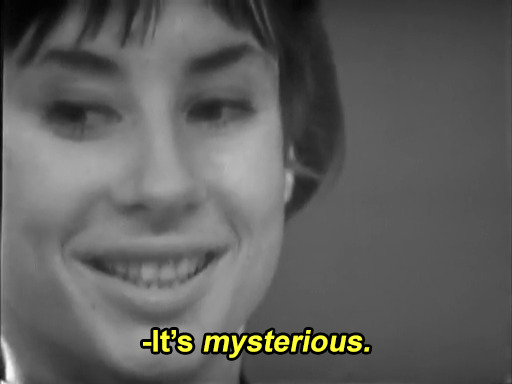
Before we begin, I would like to start by saying- I know that "An Unearthly Child," is considered part of the Cave of Skulls serial. I've chosen to treat it as it's own separate story, due to the fact that it has very little to do with the other three episodes. As far as I am concerned, you could have put any story at the end of An Unearthly Child, and the results would have been the same.
In the last two days since "The Woman Who Fell to Earth," aired, I've had discussions as to why the Doctor lost her TARDIS, and what that might mean. A worry I had was that the TARDIS had rejected Jodie, and was making her prove she was still the Doctor, which would suck for obvious reasons. But my friend suggested something else- it's just a plot device. And it makes sense. Why would Yasmine leave behind her job to travel with the Doctor? What better way is there to keep Graham and Ryan together as a family? The Doctor can't just kidnap people can she?
Watching "An Unearthly Child" can be really jolting for a lot of modern Doctor Who fans. The Doctor is cantankerous, aloof, unhelpful, and contumacious. Sure, we've seen these traits in all of our modern Doctors, but with William Hartnell, it's so prevalent. Which is why it's hard to believe there was a version of him that was even more unpleasant! So naturally, I had to find out for myself.
For those of you not in the know, when "An Unearthly Child" (or AUC) was originally filmed, BBC's Head of Drama, Sydney Newman, was unhappy with the results. He told producer Verity Lambert to reshoot the episode in its entirety with a few changes to the characters and script. Ironically, with all of the official episodes of Doctor Who that were destroyed, this unaired pilot still exists! The episode lived another sort of double life, as it was aired two weeks in a row, due to the Kennedy Assassination the day before the premiere. Or as Terry Pratchett put it- "because of public demand and that pesky business with the grassy knoll."
The beginnings of the two different versions of aren't all that different. There is an audible "bang," sound in the opening music that I had never noticed before. And oddly enough, the picture quality in the unaired version is a bit crisper. You can actually read the I.M. Forman written on the gate of the scrapyard on Totter's Lane. Though I will say the camera work in the aired version is much snappier. I'm not sure if it's just the version I have, or if it has anything to do with the 16 mm telerecording. Who knows?

Try to imagine, if you will, what it was like to watch Doctor Who back then. Science fiction was still a thing of ire. Spaceships were stupid looking, and the stories were hacky. But this was something different. Something like C.S. Lewis (who also died the day before the episode aired). No matter what programs Doctor Who has inspired since, there's still nothing quite like it. Nothing that gets so borderline surreal. Nothing that has so much staying power.
We're introduced to Ian and Barbara. Two teachers at Coal Hill School in London. Barbara is concerned about a mutual student who perplexes her. In rewatching these episodes, I was reminded of the scene in Donnie Darko when Drew Barrymore and Noah Wyle discuss the titular character, a student of theirs that seems to stand out from the rest. In comparing the two versions of AUC, the biggest difference is that Ian and Barbara are sitting down in the aired version, which seems like a good choice. There's a more intimate, less rushed feeling. They feel more familiar with one another. Evidently, the original script had indicated a romance between them but was later toned down. I don't know why. I ship it.
It's through this interaction that we meet Susan. I've always had some rather conflicted feelings about Susan. On one hand, she's kind of endearing, and in other ways, she's downright annoying. When we meet her through the lens of Ian and Barbara's perspective, she's brilliant, enigmatic, and strange. Possessing knowledge no person her age should actually know.
The Susan we meet moments later is a bit more of a kid you'd expect in the 1960's. She listens to surfer music by the fictional "John Smith and the Common Men," while sort of strumming along with the music. This marks the first appearance of the name John Smith in Doctor Who, by the way. The impression I get is that Susan was supposed to be kind of "hip." Even her hairstyle was designed by Vidal Sassoon, which is actually still pretty cool.
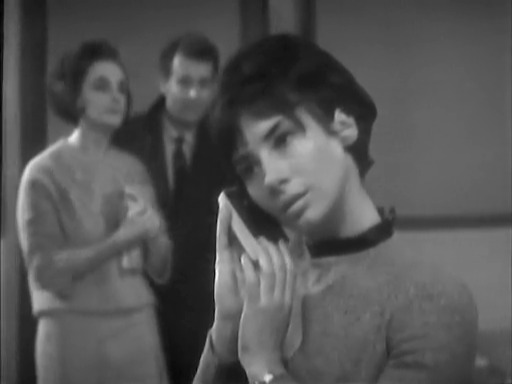
After surreptitiously trying to learn more about Susan's home situation by offering her a ride home, we're left alone with the young girl. One of the things I'm kind of sad they scrapped in the aired version, is Susan's little inkblot Rorschach test she reads like tea leaves. It was a very "I Ching," moment, that I thought made her seem almost mystical. Instead, the scene ends with Susan looking through a book on the French Revolution (all white with big black letters like it was produced in the Repo Man universe), and exclaiming- "That's not right!"
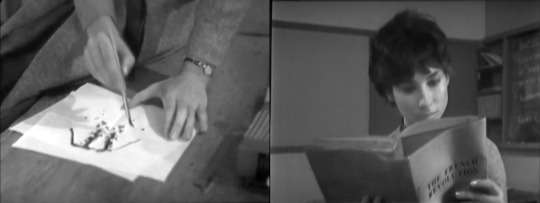
Ian and Barbara follow Susan to the address in her school file, 76 Trotter's Lane, the same scrapyard from the beginning of the episode. They follow her in to find nothing but a bunch of junk and a large blue police box. Upon touching it, Ian describes the box as "alive." It is at this point, that the two versions of the episode begin to diverge the most.
William Hartnell's initial portrayal of the Doctor is almost villainous. Where he's supposed to come off as mysterious, he comes off as scheming and methodical. Instead of thinking he has some great secret he's worried about getting out, he appears more to have some horrible secret he's hiding. You almost side with Ian and Barbara, that Susan is in danger. It's easy to see how this is wrong for the character. You want the Doctor to be independent, and at times, contrarian, but never to the point that he seems like the antagonist. Dr Smith in Lost in Space comes to mind. His initial portrayal was one of a villain, but over time, his strength was found in being a sort of anti-hero, and friend to Will Robinson.
The way they solved this? Well, he appears more curious. More aloof. Less direct and confrontational. There's a bit more twinkle in his eye the second time around. Vague threats turn into goading and daring. As Ian interrogates the Doctor, the Doctor takes interest in some of the random junk around him. His curiosity, mixed with his blasé attitude toward their concern gives him the right mix of intrigue and mischief. You can tell he's hiding something, but it feels less to evade justice, but rather to protect himself, Susan, and even the two interlopers.
A lot of the beauty in capturing this balance is in the name of the show. Who is this Doctor? Why is he in a scrapyard? What is the deal with that police box? These are the right questions that the audience should be asking. You should wonder about his intentions, but not be able to say outrightly- this man is a criminal. But Ian and Barbara are still unconvinced, as they push forward into the big box, and like a C.S. Lewis novel, into a whole new world.
Some of the best moments in Doctor Who are the big reveal of the TARDIS. It will never not be cool. But the unique element to this reveal is it's the first one that was a big reveal to the audience as well. That's actually rather unique when you give it some thought. Usually, we're all in on the joke, waiting for it. We know about the wide-eyed expressions, mouths agape. "It's bigger on the inside!" they'll say. You know something is weird about the police box. They've framed it in the middle of the shot. The episode begins around it. We've been beckoned toward it since the beginning of the story. Even with the red herring of seeing a policeman walking past it at the beginning, the low hum it emits betrays any sense that it is merely common.
Ian and Barbara, have at this point, seen too much. It's still early, days and our Doctor doesn't like showing off his special ship. We learn it's name, given by Susan as an acronym for "Time and Relative Dimension in Space," (later to be changed to "Dimensions," for no apparent reason). One of my favourite aspects of this scene is the Doctor explaining the TARDIS's dimensional capabilities by comparing it to television's ability to shrink a large object down onto a screen. It's sci-fi mumbo-jumbo, but I love it.
Another big difference we see here is that in the first version, Susan explains that she was born in the 49th century. It's a little too on the nose. Explains a little bit of the "Who" in the title too much. Another thing is the hum of the TARDIS is much more abrasive in the original version. In reviewing it just a moment ago, my cat gave me a rather cross look from the shrill noise. Like Ian said, “I have... a very sensitive ear.” Though this is not the last time the Radiophonic Workshop will pierce your eardrums.
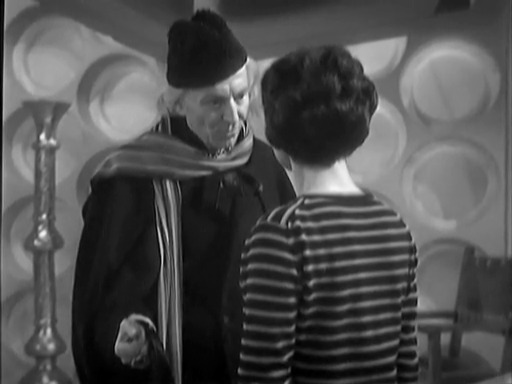
It's in this scene that we see the greatest disparity in William Hartnell's performance. He's angry, confrontational, and even calls Susan a stupid child at one point. His temper is evident and not at all endearing. It makes his decision to kidnap Ian and Barbara less one of survival, and more of one of control. While it has never made a whole lot of sense what danger two school teachers knowing his secrets could present, the Doctor chooses to kidnap his new guests. We never know why he was in the scrapyard (though we do find out in later episodes) or why Susan wanted to attend school. Susan's "why," may be self-evident, in that she's a child who wants to be around other children, but the Doctor's reasons are less evident. Either way, the scene fares far better in the aired version.
What comes next is one of my favourite shots in the history of the show. There's something exhilarating about the TARDIS among a rocky terrain, and the approaching shadow that cuts a long menacing shape against the horizon. It's pure science fiction and yet another big reveal. The Doctor wasn't lying. This ship of his really can move through space in an instant. It's a beautiful beginning to one of television's greatest sagas.

Thanks for reading! I won't be writing the Cave of Skulls retrospective until maybe next week. I have a convention to attend this weekend, so I probably won't have the time. You should probably expect more series 11 coverage around then too!
#doctor who#an unearthly child#william hartnell#first doctor#bbc#tardis#ian and barbara#susan forman#carole ann ford#jacqueline hill#william russell#ian chesterton#barbara wright
4 notes
·
View notes